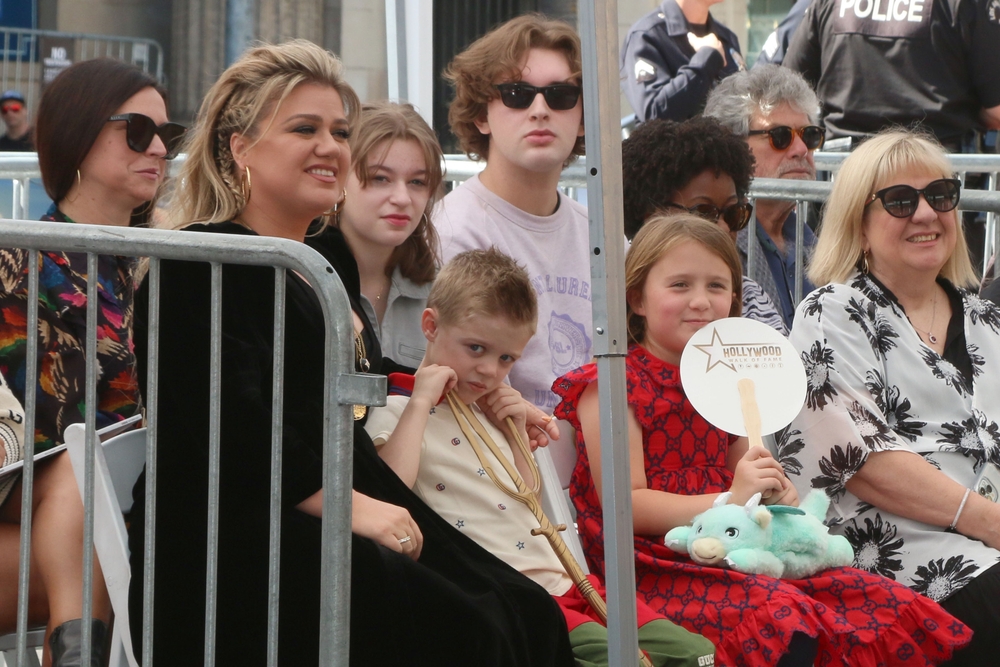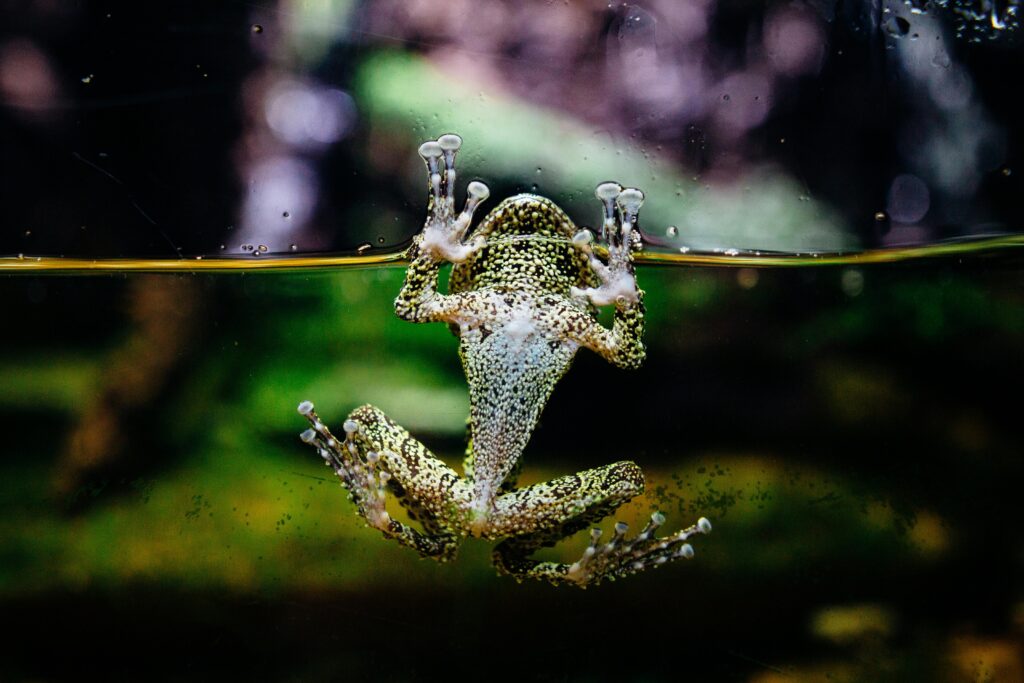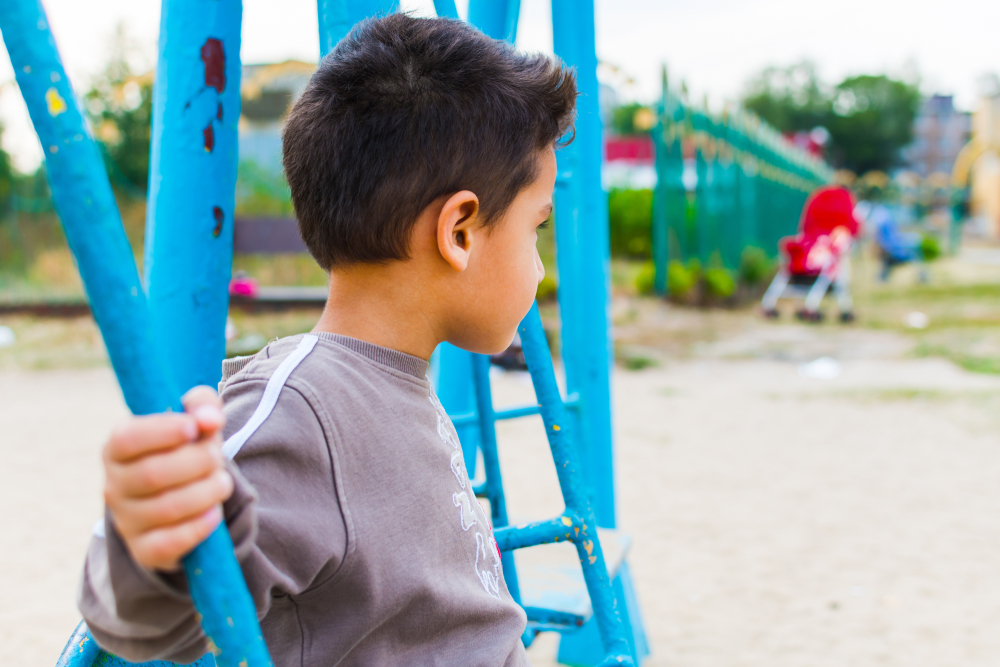News
Kelly Clarkson Admitted Spanking Her Children If They Misbehave

Kelly Clarkson is no stranger to being in the spotlight, but not all attention has been for her music or talk show hosting. A comment she made during a 2018 radio interview about spanking her children has resurfaced, stirring up strong reactions online. In the interview, the Grammy-winning singer admitted to using spanking as a form of discipline, which has sparked a heated debate about parenting practices.
Now, with Clarkson back in the public eye due to her upcoming album and continued reflections on life as a single mother, this old admission has reignited conversations on social media, leaving fans divided over her approach to parenting.
Clarkson’s Approach to Discipline
In her 2018 interview with Atlanta’s 94.1 radio station, Kelly Clarkson spoke openly about her parenting style, admitting she’s “not above a spanking” when it comes to disciplining her children, River Rose and Remington Alexander. She clarified that her approach is measured and purposeful, emphasizing, “I don’t mean hitting hard, just a spanking.”
Clarkson explained that her own upbringing shaped her views on discipline. “My parents spanked me, and I did fine in life,” she shared, pointing out that she sees nothing inherently wrong with this method when done responsibly. She also revealed that spanking isn’t her first course of action. “I always warn them first,” Clarkson said. “I tell them, ‘If you don’t stop, this is going to happen.’ And honestly, it’s worked—they don’t repeat that behavior often.”
However, she acknowledged that public perception of spanking has changed. Clarkson admitted that disciplining her kids in public is “tricky” because of societal judgment. “People think it’s wrong,” she said, but maintained her belief that it’s an effective parenting tool when applied appropriately.
Social Media and Public Backlash
When Clarkson’s comments resurfaced on social media, they sparked a wave of backlash and reignited debates over spanking as a parenting practice. Critics took to Twitter and other platforms, labeling spanking as outdated and harmful. One user described it as “abuse, full stop,” while another questioned how Clarkson’s parenting approach aligns with the emotional themes in her music. “How can you write songs like ‘Because of You’ and ‘Piece by Piece’ and still think spanking your kids is okay?” one commenter wrote.
While much of the online discussion has been critical, Clarkson also garnered support from some fans who appreciated her honesty. Supporters argued that she was simply sharing her personal experience and parenting style, which many found relatable. Still, the controversy underscored how divisive the topic of physical discipline remains, with opinions sharply split between those who see spanking as a legitimate tool and those who condemn it as harmful.
The Larger Context of Clarkson’s Parenting Challenges
Beyond the spanking debate, Kelly Clarkson has been open about the challenges of balancing parenthood with her career and personal life. Following her divorce from Brandon Blackstock, she has frequently discussed the emotional impact of the split on her two children. In a recent podcast interview, Clarkson revealed that she prioritizes open communication with her kids, even when the conversations are tough.
“I ask them every night, ‘Are you happy? And if not, what could make you happier?’” she shared. Clarkson noted that her children, River and Remington, have been candid about their feelings, often expressing sadness over their parents living in separate homes. While these moments are painful to hear, she values their honesty.
Clarkson’s approach reflects her belief in acknowledging her children’s emotions without dismissing them. “They’re not small feelings; those are huge emotions,” she said. Drawing from her own experience as a child of divorced parents, she reassures them that they are deeply loved and that the family will navigate these changes together.
The Bigger Debate Around Spanking

Kelly Clarkson’s comments have stirred up one of the oldest debates in parenting: Is spanking ever okay? For some, it’s seen as a straightforward way to teach boundaries and discipline. Others argue it does more harm than good, with studies suggesting it might lead to increased aggression or emotional struggles for kids.
Clarkson’s perspective reflects how personal these decisions can be. She grew up with spanking and feels it worked for her, but critics see it differently. Many believe there are better ways to guide children, like time-outs or positive reinforcement, that don’t involve physical punishment.
At the heart of the debate is a big question: How do parents find what works best for their family without judgment? Clarkson’s story shows just how complicated—and emotional—these choices can be.
Alternatives to Spanking: Positive Ways to Guide Your Kids
The debate over spanking has many parents wondering: Are there better ways to teach kids responsibility and self-control? The good news is, there are plenty of non-physical approaches that can help guide children’s behavior while fostering a more positive parent-child relationship.
- Positive reinforcement: Kids thrive on encouragement, and positive reinforcement is all about focusing on what they’re doing right. A simple compliment like, “I love how you shared your toys,” can go a long way. Praising good behavior not only boosts their confidence but also motivates them to keep it up. Small rewards—like a sticker chart for completed chores—can also make good behavior feel exciting and worthwhile.
- Time-outs that work: Sometimes kids need a moment to step back and cool off, and that’s where time-outs come in. The key is using them thoughtfully—give your child a quiet space to reflect on their actions without making it feel like a punishment. For younger kids, one minute per year of age is a good rule of thumb. The goal isn’t just to stop bad behavior but to give them a chance to reset.
- Logical consequences: Letting kids experience the natural results of their choices can teach powerful lessons. For instance, if your child refuses to wear a coat on a cold day, they’ll feel the chill and understand why it’s important. These kinds of consequences help kids connect their actions to real-world outcomes without needing punishment from you.
- Be Clear about boundaries: Kids do best when they know what’s expected of them. Set simple, clear rules and stick to them. For example, if you say, “No screen time until homework is done,” follow through every time. Consistency gives kids a sense of security and helps prevent confusion about the rules.
- Lead by example: Kids are little sponges—they’re always watching and learning from you. If you handle stress calmly or show kindness to others, they’re more likely to mimic those behaviors. By showing them how to navigate tricky situations with patience and respect, you’re teaching them lifelong skills for managing their emotions and relationships.
These approaches don’t just avoid the controversies of physical discipline—they also create a nurturing environment where kids can learn, grow, and thrive.
Parenting in the Spotlight
Kelly Clarkson’s admission about spanking her children has brought a deeply personal parenting choice into public view, sparking debates that go far beyond her individual experience. While her honesty has resonated with some, it’s also reignited conversations about how parenting methods evolve and how society views physical discipline today.
Parenting is rarely a one-size-fits-all journey, and Clarkson’s story highlights the complexities of raising children in a world where every decision is scrutinized. Whether you agree with her approach or not, it’s clear that Clarkson is navigating parenthood with openness and a willingness to learn—qualities that many parents can relate to, even if their methods differ.
News
Proposed $20,000,000,000,000 Tunnel Would Get You From NYC To London In Just 54 Minutes

Imagine this: the Atlantic Ocean, often seen as an unyielding barrier between continents, transformed into a high-speed highway connecting New York and London in less than an hour. No turbulence, no delays, just a 54-minute journey hurtling through an underwater tunnel at nearly 4,000 mph—faster than a jetliner, rivaling the speed of sound.
This isn’t the plot of a sci-fi blockbuster but the audacious vision of engineers who dream of revolutionizing travel as we know it. With an estimated price tag of $20 trillion—roughly the combined GDP of the world’s largest economies—this proposed transatlantic tunnel promises to shrink the world in ways we’ve never imagined. But is this bold ambition a marvel of human ingenuity or an impossible feat too ambitious for our time?

What is the Transatlantic Tunnel?
The concept of a transatlantic tunnel has existed in the realm of dreams and science fiction for over a century, but recent advancements in technology are bringing it closer to the realm of possibility. At its core, the idea is both radical and deceptively simple: a submerged tube stretching 3,100 miles across the Atlantic Ocean, inside which magnetically levitated trains (maglev) would travel in a near-vacuum environment. The absence of air resistance would allow these trains to reach mind-bending speeds of up to 4,000 mph.
Magnetic levitation technology isn’t new. In fact, it’s already used in Japan’s cutting-edge Shinkansen trains, which reach speeds of over 370 mph. However, scaling this to the level required for a transatlantic tunnel presents an engineering challenge like no other. Beyond the technology, the tunnel itself would need to withstand crushing oceanic pressures, seismic activity, and potential collisions with ships or submarines.
Originally imagined in the early 1900s by futurists and popularized in science fiction, the transatlantic tunnel was long dismissed as a pipe dream. But today, a mix of technological optimism and global connectivity has reignited discussions about its feasibility. While still far from a concrete plan, the vision of seamless intercontinental travel is no longer confined to fiction—it’s inching its way toward the drawing board of real-world engineering.
The Engineering Feat of the Century
Building a tunnel across the Atlantic Ocean is no ordinary construction project—it’s a challenge that pushes the boundaries of what humanity can achieve. At over 3,100 miles long, this underwater marvel would dwarf existing infrastructure like the Channel Tunnel, which spans a mere 31 miles beneath the English Channel. The logistical, technological, and environmental hurdles are as immense as the tunnel itself.
First, consider the structural demands. The tunnel would have to endure immense pressure from the ocean depths, where water pressure can exceed 5,800 psi—strong enough to crush conventional materials. Engineers propose using a combination of lightweight yet highly durable materials, potentially carbon-fiber composites, to construct the vacuum-sealed tubes. But even with advanced materials, creating a structure this long, without sagging or collapsing under its own weight, is a monumental task.
Then there’s the issue of magnetic levitation technology. While maglev trains already exist, scaling them to reach speeds of 4,000 mph in a vacuum is uncharted territory. Maintaining the vacuum itself, free from air leaks across thousands of miles, would require unprecedented precision and reliability. Additionally, the train system would need advanced safety protocols to prevent catastrophic accidents at such high speeds, where even minor errors could have devastating consequences.
Finally, the project would require laying the tunnel on the seabed or suspending it using tension cables—a feat complicated by uneven ocean floors, tectonic activity, and extreme weather conditions. The engineering would need to account for everything from deep-sea currents to the potential for ship anchors or submarine interference. It’s not just about building a tunnel; it’s about creating a structure that can coexist with the unpredictable forces of the ocean for decades, if not centuries.

The Eye-Watering Cost and Funding Challenges
The price tag for the proposed transatlantic tunnel is almost as staggering as the project itself—a jaw-dropping $20 trillion. To put that in perspective, it’s equivalent to nearly the combined annual GDP of the United States, China, and the European Union. While the idea of such an engineering marvel is undeniably exciting, financing it is another story altogether.
As one source puts it, this project “would require the kind of resources and global cooperation on a scale that humanity has never seen before.” Unlike conventional infrastructure, which can rely on national funding or public-private partnerships, this tunnel would necessitate collaboration between multiple governments, corporations, and engineering experts across the globe.
However, many experts remain skeptical. Michael Laine, founder of LiftPort Group, stated bluntly, “The expense and difficulty of constructing it far outweigh any potential benefits.” Such criticism is echoed by economists and engineers alike, who question whether the tunnel could ever recoup its investment. Would enough people even use it to justify the astronomical cost?
Moreover, the financing dilemma goes beyond cost alone. The geopolitical implications are immense. Who would own and control such a massive piece of infrastructure spanning international waters? And how would disagreements over funding, maintenance, and profits be resolved between nations? Without ironclad agreements and unprecedented levels of cooperation, the project could falter before construction even begins.
Despite these challenges, proponents argue that the tunnel represents a step toward a more interconnected and efficient world. But with such an immense price tag and countless logistical hurdles, many are left wondering if the idea is simply too good to be true.
Time-Saving Potential and Its Global Impact
The most tantalizing aspect of the transatlantic tunnel is its promise to revolutionize travel by reducing the journey between New York City and London to just 54 minutes. Currently, a transatlantic flight takes around seven hours—a monumental difference that could reshape how people and goods move across the world.
This level of speed could redefine the concept of globalization. As CNN highlighted, such a tunnel “would make it possible to live in one city and work in the other,” creating unprecedented opportunities for international business and collaboration. Imagine attending a morning meeting in Manhattan and enjoying dinner in London on the same day, all without the fatigue of a long-haul flight.
Beyond convenience, the tunnel has the potential to drastically reduce carbon emissions. Air travel is one of the most significant contributors to global CO₂ levels, and a vacuum-based maglev train could provide a cleaner alternative. Proponents argue that if the tunnel is powered by renewable energy, it could pave the way for more sustainable intercontinental transportation.
However, critics question whether the world is ready for such a seismic shift. The aviation industry, for example, could face immense disruption, with airlines potentially losing a significant share of transatlantic traffic. Entire economies reliant on air travel could be forced to adapt. Additionally, the sheer scale of the tunnel might create new environmental challenges, such as impacts on marine ecosystems during construction.
The Critics Weigh In: Too Ambitious or Visionary?
Despite its groundbreaking allure, the proposed transatlantic tunnel has no shortage of skeptics. For many experts, the project seems more like a fantastical dream than a feasible reality. From engineering hurdles to astronomical costs, critics argue that the obstacles far outweigh the benefits.
One major concern is the sheer complexity of building and maintaining a 3,100-mile tunnel under the Atlantic Ocean. The tunnel would need to withstand the crushing pressure of the ocean while remaining completely airtight to maintain the vacuum required for maglev trains to reach speeds of 4,000 mph. Such a structure would demand engineering precision and durability on a scale humanity has never achieved—and sustained for decades.
Then there’s the risk factor. High-speed travel in a vacuum is uncharted territory, and the consequences of a catastrophic failure could be unimaginable. What happens if the vacuum system fails? How would passengers be evacuated in the middle of the Atlantic Ocean? These are critical safety questions without clear solutions.
Critics also raise concerns about geopolitical cooperation. A project of this magnitude would require unprecedented levels of collaboration and trust between nations. Coordinating construction, funding, and eventual management of a tunnel spanning international waters is no small feat, and disagreements over ownership or maintenance could jeopardize the entire endeavor.
A Bold Vision or an Impossible Dream?
The proposed transatlantic tunnel represents one of the most ambitious ideas ever conceived—a project that could redefine global connectivity, transform economies, and reshape the way we think about travel. With the ability to transport passengers from New York to London in just 54 minutes, the tunnel promises a future where oceans are no longer barriers but seamless bridges between continents.
However, the challenges are as monumental as the vision itself. From the staggering $20 trillion price tag to unprecedented engineering and geopolitical complexities, the project is a gamble that tests the limits of human innovation. Critics question whether the risks—financial, technological, and environmental—are too great, while proponents see it as a necessary leap toward a more interconnected and sustainable world.
Whether this tunnel becomes a reality or remains a dream beneath the waves, its mere proposal reminds us of humanity’s boundless ambition. It’s a vision that invites us to rethink what’s possible, daring us to push the boundaries of technology and imagination. The real question isn’t just if we can build it, but whether we’re ready to embrace the kind of global cooperation and bold innovation required to bring it to life.
News
We’re Going Back To The Moon! Meet The Crew Of Artemis II

For over half a century, the Moon has loomed in the night sky as both a symbol of human triumph and an unfulfilled promise. The Apollo missions left their footprints, but also unanswered questions—about what lies beyond, and what humanity’s next great leap might be. Now, with NASA’s Artemis program, we’re not just revisiting the Moon; we’re redefining our relationship with it.
Why go back? This time, it’s not just about planting flags or taking photographs. It’s about laying the foundation for humanity’s future in space. With Artemis II, a diverse team of astronauts is gearing up to embark on a journey that will push the boundaries of exploration and technology, paving the way for missions to Mars and beyond.

What Is Artemis II?
Artemis II represents the next pivotal step in humanity’s journey to explore deep space, serving as the first crewed mission in NASA’s Artemis program. Unlike the Apollo missions that preceded it, Artemis isn’t just about returning to the Moon—it’s about preparing for the future. This mission will orbit the Moon, testing critical systems and gathering essential data to ensure the safety and success of future lunar landings and even missions to Mars.
The spacecraft at the heart of Artemis II is the Orion capsule, powered by NASA’s Space Launch System (SLS), the most powerful rocket ever built. Together, they will carry the crew on a 10-day mission around the Moon, reaching a distance of over 230,000 miles from Earth. NASA officials describe it as “the next milestone in humanity’s quest to push farther into the solar system.”
According to NASA, Artemis II will provide an opportunity to “demonstrate key capabilities and operations needed for humans to live and work on another world.” It’s not just a technical test—it’s a statement of intent. As NASA Administrator Bill Nelson put it: “This is humanity’s next great chapter of exploration. Artemis II will help us chart a path to the Moon that is more inclusive, innovative, and ambitious than ever before.”
The Artemis program is also groundbreaking in its inclusivity, aiming to land the first woman and the first person of color on the lunar surface. But before that can happen, Artemis II must ensure that everything is ready for Artemis III to safely achieve this historic milestone.
With technology that surpasses anything used during the Apollo missions and a clear vision for sustainable lunar exploration, Artemis II is setting the stage for a future where humanity can call the Moon more than just a distant neighbor—it could become a stepping stone to the stars.
Meet the Crew of Artemis II
At the heart of Artemis II lies its crew—four astronauts selected to represent the pinnacle of human achievement and the collaborative spirit of space exploration. Each of them brings a wealth of experience, skills, and a unique perspective to this historic mission.
Reid Wiseman (Commander)
Leading the mission is Reid Wiseman, a veteran astronaut with over 165 days in space during a previous expedition to the International Space Station (ISS). As Commander of Artemis II, Wiseman will oversee the mission’s operations, ensuring its success. Known for his leadership and dedication, Wiseman has said, “We are going to the Moon as one team, one crew, and one incredible global effort.”
Victor Glover (Pilot)
Making history as the first person of color to travel to the Moon, Victor Glover serves as the pilot of Artemis II. Glover previously spent 168 days aboard the ISS and contributed to multiple spacewalks. On his role in the mission, Glover remarked, “Representation matters. This mission is not just about where we’re going but who we’re taking along on this journey into the future.” His inclusion underscores NASA’s commitment to diversity and equity in space exploration.
Christina Koch (Mission Specialist)
Christina Koch is no stranger to breaking barriers. She holds the record for the longest single spaceflight by a woman, spending 328 days in orbit during her time aboard the ISS. As a mission specialist, Koch will bring her expertise in engineering and space operations to Artemis II. “It is an honor to be part of a mission that paves the way for humanity’s next steps on the Moon and beyond,” Koch said about her historic selection.
Jeremy Hansen (Mission Specialist)
Representing the Canadian Space Agency (CSA), Jeremy Hansen becomes the first Canadian astronaut to venture beyond low Earth orbit. His inclusion highlights the international collaboration fueling the Artemis program. Hansen, a former fighter pilot, shared his excitement, saying, “I am humbled to represent Canada on this mission and to contribute to a global effort that will benefit all of humanity.”
Together, these four astronauts symbolize the ambition, courage, and diversity of the Artemis program. Their mission is not just to orbit the Moon but to inspire a generation to dream bigger and reach farther than ever before.

The Goals and Vision of Artemis II
Artemis II is more than a mission; it’s a defining moment in humanity’s effort to explore the unknown. With its primary goal of conducting a 10-day crewed lunar flyby, the mission serves as a crucial stepping stone for NASA’s long-term vision of sustainable exploration on the Moon and beyond. It’s the bridge between testing uncrewed systems in Artemis I and achieving a historic lunar landing in Artemis III.
The mission will focus on validating the life-support systems and performance of the Orion spacecraft in a deep-space environment. These tests are vital to ensuring the safety of future astronauts who will eventually live and work on the lunar surface. NASA describes Artemis II as “a mission designed to test every system, every capability, and every moment of human readiness needed for long-term exploration.”
Beyond the technical achievements, Artemis II has a broader purpose: advancing scientific discovery and inspiring a new generation of explorers. As part of its objectives, the Artemis program aims to establish a sustainable presence on the Moon by the end of the decade. This includes constructing the Lunar Gateway, a space station that will orbit the Moon and act as a hub for research and exploration.
According to NASA, these efforts are part of the agency’s commitment to using the Moon as a stepping stone for even greater ambitions, such as sending humans to Mars. “Artemis is not just a mission to the Moon; it’s humanity’s pathway to the stars,” said NASA Administrator Bill Nelson.
By combining cutting-edge technology with a bold vision for the future, Artemis II is laying the groundwork for a new era of exploration. It’s a mission that doesn’t just look to the Moon but far beyond—toward a future where humanity’s reach truly knows no bounds.
The Global Collaboration Driving Artemis II
Artemis II is a testament to the power of international collaboration, with space agencies from around the world joining forces to make this historic mission possible. While NASA leads the charge, the inclusion of the Canadian Space Agency (CSA) and the European Space Agency (ESA) highlights how humanity’s reach into the cosmos is a shared endeavor.
One of the most symbolic aspects of this collaboration is the participation of Jeremy Hansen, the Canadian astronaut who will become the first non-American to venture beyond low Earth orbit. Canada’s contribution to Artemis includes the development of Canadarm3, an advanced robotic system that will be used on the Lunar Gateway. Hansen reflected on the significance of his role, saying, “This mission proves what we can achieve when we work together—nations united by curiosity, ambition, and a common goal.”
The European Space Agency has also played a pivotal role, supplying the European Service Module (ESM), which powers and propels the Orion spacecraft. The ESM provides air, water, and electricity for the astronauts, making it an indispensable part of the mission. “The European Service Module is at the heart of this mission,” ESA officials said, emphasizing its role as a foundation for future human exploration.
This spirit of global cooperation is central to the Artemis program’s vision of inclusivity and shared progress. NASA Administrator Bill Nelson stated, “The Artemis missions are not just about America going to the Moon; they’re about humanity going to the Moon. Together, we’re proving what’s possible.”
The international partnerships behind Artemis II not only strengthen diplomatic ties but also ensure that the mission benefits all of humanity. By pooling expertise, resources, and innovation, these collaborations are creating opportunities that extend beyond national boundaries—reminding us that space exploration is a global effort driven by a shared dream.

The Technology Powering Artemis II
Artemis II stands as a showcase of cutting-edge technology, blending decades of engineering advancements with new innovations designed to push the boundaries of human exploration. At the heart of the mission are the Orion spacecraft and the Space Launch System (SLS), two groundbreaking systems that make Artemis II possible.
The Orion spacecraft serves as the astronauts’ home for the duration of the mission. Designed to withstand the harsh environment of deep space, Orion is equipped with advanced life-support systems, radiation shielding, and navigation technologies. Its European-built Service Module (ESM) supplies propulsion, electricity, and vital resources such as water and oxygen. According to ESA, “The European Service Module is the powerhouse of Orion, enabling it to go farther than any human-rated spacecraft before.”
Complementing Orion is the Space Launch System (SLS), NASA’s most powerful rocket ever built. Towering at 322 feet, the SLS generates a staggering 8.8 million pounds of thrust, enough to propel the crew on their journey to the Moon. NASA officials describe it as “the backbone of the Artemis program, designed to take us deeper into space than ever before.” The rocket’s performance during Artemis I demonstrated its capability, clearing the way for its crewed debut in Artemis II.
Another key innovation supporting Artemis II is the Launch Abort System (LAS), which ensures the astronauts’ safety in the event of an emergency during launch. This system, mounted atop the Orion spacecraft, can pull the crew to safety within milliseconds, showcasing the program’s commitment to prioritizing human life.
Together, these technologies represent the pinnacle of human ingenuity. They are not only enabling the Artemis II mission but are also laying the foundation for future lunar landings and interplanetary travel. As NASA’s Deputy Administrator Pam Melroy stated, “Artemis II is proof that we have the tools, the talent, and the tenacity to explore beyond our world.”
By integrating proven systems with innovative designs, Artemis II serves as a blueprint for the future of space exploration, showing what’s possible when ambition meets cutting-edge technology.
Environment
Earth’s Spinning Inner Core May Be Slowing Down Compared To Earth’s Surface

Deep beneath our feet, a secret rhythm pulses within the Earth’s core—a dynamic, swirling dance that has captivated scientists for decades. Far from the reach of human instruments, this mysterious inner core spins like a celestial body trapped within our planet, its movement hinting at the hidden forces shaping our world.
Recent studies suggest a surprising twist in this tale: the inner core’s spin may be slowing down, sparking questions about what this could mean for the Earth’s magnetic field, day length, and even the future of our planet. While the effects remain imperceptible to daily life, the implications stretch far beyond what meets the eye.
What lies at the heart of this discovery? And how does a slowing inner core impact the Earth as we know it?
What Is the Earth’s Inner Core?
Nestled at Earth’s center lies the inner core—a solid sphere composed predominantly of iron and nickel, with a radius of approximately 1,220 kilometers, about 70% that of the Moon. Despite its scorching temperatures, comparable to the Sun’s surface, the immense pressures render it solid. This inner core is encased by a fluid outer core, allowing it to rotate independently from Earth’s mantle and crust.
The concept of the inner core’s differential rotation emerged in the 1970s and ’80s, gaining traction in the ’90s with seismological evidence. By analyzing seismic waves from earthquakes traversing the inner core, scientists observed variations in wave behavior over time, suggesting that the inner core rotates at a different rate than Earth’s surface. This differential rotation is believed to be influenced by the dynamic interactions between Earth’s magnetic field and gravitational forces.
Recent studies have provided compelling evidence that the inner core’s rotation is not constant but oscillates over decades. A 2023 study published in Nature Geoscience proposed that the inner core’s rotation undergoes a 70-year cycle, alternating between periods of spinning slightly faster and slightly slower than Earth’s surface. This finding was further supported by a 2024 study in Nature, which confirmed that the inner core began to decrease its speed around 2010, moving slower than Earth’s surface.
Understanding the inner core’s behavior is crucial, as it plays a significant role in generating Earth’s magnetic field and can influence phenomena such as the length of a day. However, due to the inner core’s inaccessibility, much of its dynamics remain shrouded in mystery, with ongoing research striving to unravel its secrets.
As Dr. John Vidale, a seismologist at the University of Southern California, remarked, “We’ve been arguing about this for 20 years, and I think this nails it.” This sentiment underscores the scientific community’s dedication to comprehending the inner workings of our planet.
The Discovery: Slowing Spin

In recent years, scientists have uncovered compelling evidence that Earth’s inner core—a solid sphere of iron and nickel—has been experiencing changes in its rotation relative to the planet’s surface. This revelation stems from meticulous analyses of seismic waves generated by earthquakes, which traverse the Earth’s interior and provide insights into the dynamics of the inner core.
A pivotal study published in Nature Geoscience in January 2023 by researchers from Peking University analyzed seismic data from the 1960s to 2021. Their findings indicated that the inner core’s rotation had nearly halted around 2009 and might have even reversed direction. The researchers proposed that this phenomenon is part of a 70-year oscillation cycle, wherein the inner core alternates between rotating slightly faster and slightly slower than the Earth’s surface.
Further supporting this concept, a June 2024 study published in Nature by scientists from the University of Southern California provided unambiguous evidence that the inner core began to decrease its speed around 2010, moving slower than the Earth’s surface. This study reinforced the idea of a decadal oscillation in the inner core’s rotation.
These findings have significant implications for our understanding of Earth’s internal processes. The oscillation in the inner core’s rotation is believed to be linked to variations in the Earth’s magnetic field and could influence the length of a day. However, the exact mechanisms driving these changes remain a subject of ongoing research and debate within the scientific community.
As Dr. John Vidale, a seismologist at the University of Southern California, remarked, “When I first saw the seismograms that hinted at this change, I was stumped. But when we found two dozen more observations signaling the same pattern, the result was inescapable.”
How the Core’s Movement Impacts Earth
The inner core’s rotation plays a pivotal role in Earth’s geophysical phenomena, particularly influencing the planet’s magnetic field and the length of a day. The motion of the liquid iron outer core, which surrounds the solid inner core, generates Earth’s magnetic field through the geodynamo process. The inner core’s rotation contributes to stabilizing and sustaining this magnetic field.
Recent studies have observed that the inner core’s rotation has been slowing down since around 2010. This deceleration could potentially affect the dynamics of the outer core and, consequently, the Earth’s magnetic field. However, any changes are expected to be subtle and occur over long timescales.
Additionally, the inner core’s rotation influences Earth’s rotation rate, thereby affecting the length of a day. As the inner core’s rotation slows, it may cause slight variations in the planet’s rotation rate. However, these changes are expected to be on the order of milliseconds and would not be noticeable in everyday life.
Understanding the inner core’s behavior is crucial, as it plays a significant role in generating Earth’s magnetic field and can influence phenomena such as the length of a day. However, due to the inner core’s inaccessibility, much of its dynamics remain shrouded in mystery, with ongoing research striving to unravel its secrets.
As Dr. John Vidale, a seismologist at the University of Southern California, remarked, “When I first saw the seismograms that hinted at this change, I was stumped. But when we found two dozen more observations signaling the same pattern, the result was inescapable.”

The Ongoing Debate
The rotation of Earth’s inner core has been a subject of scientific debate for decades. Early studies in the 1990s suggested that the inner core rotates slightly faster than the Earth’s mantle and crust—a phenomenon termed “super-rotation.” However, more recent research indicates that this rotation may not be constant and could even reverse direction over time.
In 2023, a study published in Nature Geoscience proposed that the inner core’s rotation undergoes a 70-year cycle, alternating between periods of super-rotation and sub-rotation. This finding was further supported by a 2024 study in Nature, which provided evidence that the inner core began to decrease its speed around 2010, moving slower than the Earth’s surface.
Despite these findings, the scientific community remains divided. Some researchers argue that observed changes in seismic wave travel times could be attributed to physical alterations on the inner core’s surface rather than changes in its rotation.
Others suggest that the inner core’s movement is more complex than a simple oscillation and may involve irregular patterns influenced by interactions with the outer core and mantle.
The challenges in studying the inner core stem from its inaccessibility; scientists rely on indirect measurements, such as seismic wave analyses, which can lead to varying interpretations. As a result, while recent studies have provided valuable insights, the exact nature of the inner core’s rotation and its implications for Earth’s geodynamics remain active areas of research and debate.
As Dr. John Vidale, a seismologist at the University of Southern California, noted, “Other scientists have recently argued for similar and different models, but our latest study provides the most convincing resolution.”
The Pulse of Our Planet
The discovery of the Earth’s inner core’s slowing rotation is a testament to the complexity and dynamism of our planet’s hidden layers. While imperceptible in our daily lives, the changes deep beneath our feet influence magnetic fields, seismic activity, and even the length of a day. These revelations remind us that our world is constantly evolving, driven by forces both seen and unseen.
The ongoing research into the inner core’s rotation underscores the importance of scientific curiosity and collaboration. As technology advances and new methods emerge, the mysteries of Earth’s interior will continue to unravel, offering deeper insights into the forces that shape our planet. For now, the slowing spin of the inner core stands as a captivating reminder of the interconnectedness of Earth’s layers and the intricate dance that keeps our world in motion.
Entertainment
Cillian Murphy Returns As Zombie In 28 Years Later Trailer Leaving People Shocked

The 28 Days Later franchise is no stranger to delivering jaw-dropping moments, and the recently released trailer for its latest installment, 28 Years Later, has left fans buzzing. A brief but chilling scene shows an emaciated zombie rising from the shadows—a figure that bears an uncanny resemblance to none other than Cillian Murphy. Known for his gripping portrayal of Jim in the original 2002 film, Murphy’s possible return in this form has sparked intense speculation across social media.
But is this really the fate of one of the series’ most iconic survivors, or is there more to the story than meets the eye? As details about the sequel remain tightly under wraps, fans are left to wonder about the true nature of Murphy’s involvement in this high-stakes continuation of the beloved zombie saga. Could this be the twist that changes everything?
Fan Theories and Reactions
The release of the 28 Years Later trailer has ignited a whirlwind of fan theories and reactions, particularly concerning a fleeting yet haunting image of an emaciated zombie bearing a striking resemblance to Cillian Murphy’s character, Jim, from the original film. This brief glimpse has sent social media platforms into overdrive, with fans expressing a mix of horror, excitement, and curiosity.
One fan took to Twitter, stating, “The one second shot of Cillian Murphy is giving me a bone deep sense of terror.”
Another remarked, “Whoa, Cillian looks absolutely haunting in this first look.”
These reactions underscore the profound impact that Murphy’s potential return, especially in such a transformed state, has on the audience.
The speculation isn’t limited to casual viewers; dedicated fan communities are abuzz with theories dissecting the trailer frame by frame. Some posit that Jim’s transformation into a zombie could serve as a poignant narrative device, symbolizing the relentless and indiscriminate nature of the Rage Virus. Others hope that this might be a red herring, suggesting that the character’s fate is more complex than the trailer implies.
This phenomenon isn’t just about a character’s return; it taps into the psychology of fandom. Studies have shown that fans form deep emotional connections with fictional characters, often experiencing real emotions in response to fictional events. According to research published in PLOS ONE, fans may experience significant upset and distress when a television series ends, influenced by their connection to the series and its characters.
This emotional investment explains the intense reactions to Jim’s potential fate, as fans grapple with the possibility of a beloved character’s tragic end.
The ambiguity surrounding Murphy’s role fuels further discussion. While some fans are convinced of his zombified return, others remain skeptical, awaiting official confirmation. This uncertainty keeps the conversation alive, as fans analyze every detail for clues.
Clarification from the Film Team

The eerie resemblance between the emaciated zombie in the 28 Years Later trailer and Cillian Murphy’s character, Jim, from the original film ignited widespread speculation among fans. However, it has been confirmed that this unsettling figure is portrayed by newcomer Angus Neill, not Murphy. Neill, an art dealer and model, was cast by director Danny Boyle, who was struck by his distinctive appearance. Neill shared his experience, stating, “Danny told me he’d always had me in mind for the role. So we met up, hit it off, and I agreed to take part.”
Neill further described the intensity of working with Boyle, noting, “On set he has an extraordinary ability to hypnotize you, and working with him on the film was a very, very intense experience.”
This revelation has provided clarity for fans who were concerned about the fate of Jim, a character who has become iconic in the zombie genre. While Murphy is confirmed to be involved in 28 Years Later as an executive producer, the specifics of his on-screen role remain undisclosed. Sony Motion Pictures Group chairman Tom Rothman hinted at Murphy’s participation, stating, “Yes, but in a surprising way and in a way that grows, let me put it that way.”
The deliberate ambiguity surrounding Murphy’s role has fueled further intrigue and anticipation among the fanbase. This strategic withholding of information aligns with marketing techniques that leverage suspense to heighten audience engagement. Studies in film marketing suggest that controlled ambiguity can effectively build anticipation and discussion among potential viewers.
Murphy’s Role in the New Film

Cillian Murphy’s association with 28 Years Later has been a focal point of fan speculation and anticipation. While the trailer sparked rumors of his character, Jim, returning as a zombie, it has been confirmed that the emaciated infected is portrayed by newcomer Angus Neill, not Murphy.
Murphy is officially involved in the project as an executive producer, marking his first foray into this role within the franchise.
This position suggests a significant influence over the film’s creative direction, though it doesn’t clarify whether he will appear on screen.
In May 2024, reports confirmed that Murphy would reprise his role as Jim in 28 Years Later.
However, the nature and extent of his character’s involvement remain undisclosed, leading to various fan theories. Some speculate that Jim may have survived the decades since the original outbreak, potentially playing a pivotal role in the new narrative. Others wonder if his appearance might be limited to flashbacks or cameo scenes.
Sony Motion Pictures Group chairman Tom Rothman hinted at Murphy’s participation, stating, “Yes, but in a surprising way and in a way that grows, let me put it that way.”
This cryptic comment has only fueled further speculation about Jim’s fate and significance in the upcoming film.
The deliberate ambiguity surrounding Murphy’s role serves as a strategic marketing tool, heightening audience interest and engagement. By keeping specific details under wraps, the filmmakers ensure that fans remain eager to uncover the mysteries when the film is released.
What We Know About 28 Years Later
The 28 Days Later franchise is set to make a significant return with its third installment, 28 Years Later, scheduled for release on June 20, 2025. Directed by Danny Boyle and written by Alex Garland, the film reunites the original creative duo, promising a continuation of the intense, post-apocalyptic narrative that captivated audiences in 2002.
Set nearly three decades after the initial outbreak of the Rage Virus, 28 Years Later explores a world where survivors have adapted to a new, perilous reality. The story centers on a group residing on a secluded island, connected to the mainland by a heavily defended causeway. Their fragile sense of security is shattered when a member ventures into the mainland, uncovering mutated horrors and challenging the group’s survival instincts. Ralph Fiennes, who portrays a doctor in the film, revealed that the plot “centres on a young boy” seeking help for his ailing mother, adding a poignant layer to the harrowing journey.
Cast and Characters
The film boasts a star-studded ensemble, including:
- Jodie Comer: Known for her versatile performances, Comer brings depth to the survivor narrative.
- Aaron Taylor-Johnson: His role adds a dynamic presence to the ensemble.
- Ralph Fiennes: Portraying a doctor, Fiennes’ character becomes a pivotal figure in the unfolding events.
- Cillian Murphy: Returning as Jim, Murphy’s involvement is confirmed, though the nature of his role remains under wraps, fueling fan speculation.
With a reported budget of $75 million, 28 Years Later marks a significant escalation in production scale compared to its predecessors. Innovatively, the film was shot entirely on an iPhone 15 Pro Max, a creative choice that aligns with Boyle’s penchant for digital filmmaking and aims to retain the gritty aesthetic of the original.
28 Years Later is poised to be the first installment in a new trilogy, with subsequent films already in development. Principal photography for the sequel, titled 28 Years Later Part II: The Bone Temple, commenced in August 2024, directed by Nia DaCosta.
As the release date approaches, anticipation builds among fans eager to witness the next chapter in this iconic horror saga. The combination of returning talent and fresh storytelling perspectives promises to deliver a compelling continuation of the 28 Days Later legacy.
The Future Awaits
The 28 Days Later franchise has always been about pushing boundaries, both in storytelling and cinematic innovation, and 28 Years Later seems poised to continue that legacy. From its intriguing premise and star-studded cast to the swirling mystery surrounding Cillian Murphy’s role, the film has already captured the imagination of its devoted fanbase.
While the trailer has raised more questions than it has answered, it has undeniably reignited excitement for a series that revolutionized the zombie genre. Fans will eagerly await June 2025, not only to uncover Jim’s fate but to dive back into a world that has continued to evolve in chaos and terror. The Rage Virus, and the survival stories it inspires, remains as potent as ever—cementing 28 Years Later as one of the most highly anticipated horror films of the decade.
Featured image from Facebook @28DaysLaterMovie
News
Elementary School Students Discover EpiPens Turn Extremely Poisonous In Space

In the boundless expanse of space, even the most trusted tools can turn treacherous. A group of bright, young minds from St. Brother André Elementary School has stumbled upon a startling discovery that challenges our assumptions about medical safety in outer space. While experimenting with EpiPens under the harsh conditions of cosmic radiation, these students unearthed a potentially life-threatening transformation that no one—not even NASA—had anticipated. This revelation not only raises critical questions about the reliability of essential medications beyond Earth but also marks a significant leap in our understanding of space’s impact on pharmaceuticals.
Cosmic Challenges for Medical Safety in Space
In an inspired union of education and space exploration, students from St. Brother André Elementary School’s Program for Gifted Learners embarked on a fascinating scientific venture to explore the effects of cosmic radiation on medical devices—specifically EpiPens. This journey began with a simple, yet profound question: How does exposure to space conditions affect the efficacy of EpiPens, which are crucial for treating severe allergic reactions?
Collaborating with NASA through the innovative “Cubes in Space” program, these young scientists launched their experiment into the vast unknown. They adapted the standard EpiPen format to fit within small payload cubes, due to the constraints of the project, which were then sent into space aboard a rocket and a high-altitude balloon. This unique setup allowed the students to directly investigate the stability of epinephrine, the active ingredient in EpiPens, under the influence of cosmic radiation.
Upon their return to Earth, the samples underwent rigorous analysis at the University of Ottawa’s John L. Holmes Mass Spectrometry Facility. The findings were startling. Instead of the stable life-saving medication they had sent up, the analysis revealed that a significant transformation had occurred: 13% of the epinephrine had degraded into toxic benzoic acid derivatives, leaving the remaining 87% in a compromised state. This chemical alteration rendered the EpiPens not only ineffective but potentially hazardous.
Professor Paul Mayer, from the University of Ottawa’s Department of Chemistry and Biomolecular Sciences, highlighted the impact of these findings, stating that the degraded samples posed serious questions about the viability of EpiPens for space travel. These discoveries underline a critical area of concern for astronaut safety and the preservation of medications in extraterrestrial environments.
Encouraged by their findings and driven by a natural curiosity, the students are not stopping here. They are currently designing a protective capsule that could shield EpiPens and other medications from the harsh realities of cosmic radiation. This proactive approach could pave the way for safer long-duration human spaceflights, where every medical tool counts.
This initiative not only showcases the potential of young minds to contribute significantly to science but also emphasizes the need for continued research into the effects of space travel on health and medicine. As we look towards future missions and the possibility of interplanetary travel, ensuring the stability and safety of medical supplies in space will be paramount.

Unveiling the Unexpected Toxicity of EpiPens in Space
The experiment conducted by the students from St. Brother André Elementary School yielded groundbreaking results that have profound implications for space travel and medical safety. Upon the return of the EpiPen samples from space, a detailed analysis was conducted at the University of Ottawa, revealing startling transformations in the epinephrine’s chemical composition.
The primary finding was that the epinephrine within the EpiPens had degraded significantly due to exposure to cosmic radiation. Only 87% of the original substance remained unchanged, while the remaining 13% had transformed into benzoic acid derivatives, compounds known for their toxicity. This degradation rendered the EpiPens not only ineffective but dangerously toxic.
Professor Paul Mayer of the Faculty of Science’s Department of Chemistry and Biomolecular Sciences commented on the severity of these findings, emphasizing the impact on the viability of such medical interventions in space:
“In fact, no epinephrine was found in the ‘after’ EpiPen solution samples,” Mayer stated. “This result raises questions about the efficacy of an EpiPen for outer space applications and these questions are now starting to be addressed by the kids.”
The implications of these results are significant. Cosmic radiation, composed of high-energy particles emitted by the sun and other celestial bodies, poses a known threat to astronauts’ health, increasing the risk of conditions such as radiation sickness, cancer, and other diseases. The experiment highlights a new dimension of this risk—its effect on medications, crucial for emergency medical interventions.
These findings align with existing research on the vulnerability of pharmaceuticals to environmental factors and the specific challenges posed by space conditions. Studies have indicated that many medications show altered stability profiles under conditions of microgravity, radiation, and other stresses typical of the space environment.
The students’ work contributes to a vital area of space research, indicating a need for the development of medication formulations and packaging that can withstand the unique conditions of space. This will be essential for ensuring the safety and well-being of astronauts as missions venture further into space and for longer durations.

Rethinking Medical Safety in Space
The discovery by the students from St. Brother André Elementary School that EpiPens can become toxic in space due to cosmic radiation has significant implications for the future of space travel, particularly as missions aim to go further and last longer. This revelation highlights a critical oversight in the preparedness for medical emergencies in extraterrestrial environments and sparks a broader discussion on the stability and safety of all medications in space.
- Impact on Space Medicine: The transformation of epinephrine into toxic benzoic acid derivatives under the influence of cosmic radiation underscores the urgent need for pharmaceutical stability in space. This finding is particularly alarming as it suggests that other critical medications might also be at risk of degradation in similar conditions. As Professor Paul Mayer noted, “This result raises questions about the efficacy of an EpiPen for outer space applications and these questions are now starting to be addressed by the kids.”
The broader medical and space exploration communities must consider these findings seriously, as they could have direct implications for the health and safety of astronauts. Ensuring that astronauts have access to effective and safe medical treatments is paramount, especially as missions extend to the Moon, Mars, and beyond.
- Regulatory and Research Directions: This discovery may prompt space agencies and pharmaceutical researchers to re-evaluate how medications are tested for space travel. Current standards for medical safety on Earth may not be sufficient for space, where exposure to cosmic radiation and other unique conditions can alter chemical compositions dramatically. New guidelines and more rigorous testing protocols may need to be developed to address these challenges.
- Innovation and Engineering Solutions: Encouraged by their findings, the students are already working on potential solutions, including the design of a protective capsule to shield EpiPens and possibly other medications from the harmful effects of cosmic radiation. This proactive approach could lead to innovations that benefit not just space travel but also other areas where medication stability is affected by environmental factors.
- Educational and Inspirational Impact: Moreover, this discovery highlights the importance of engaging young minds in real-world scientific challenges. The project not only contributes valuable data to the field of space medicine but also inspires a new generation of scientists, engineers, and explorers. As Professor Mayer expressed, the success of these students confirms that “Kids are natural scientists. They are curious and ask questions. We adults just need to facilitate their participation in the scientific process, and then get out of the way and let them explore and learn.”
Pioneering Protection for Space Medications
The students from St. Brother André Elementary School did not stop at just discovering a significant issue with EpiPens in space; they are actively working on innovative solutions to mitigate this newfound risk. Motivated by their groundbreaking findings, these young scientists are in the process of designing a protective capsule that aims to safeguard epinephrine from the deleterious effects of cosmic radiation.
- Developing Protective Technologies: The concept involves a specialized container that can insulate the medication from the high-energy particles pervasive in space. This capsule is designed to counter the specific conditions that caused the epinephrine degradation observed in their experiments. As Professor Paul Mayer stated, “The students are now designing a capsule to protect EpiPens while in space. In June, they will travel to the Langley Research Center in Hampton, Virginia, to present their findings to NASA.” This initiative represents a practical application of their research, potentially revolutionizing how medical supplies are maintained in space environments.
- Collaborative Efforts and Engineering Challenges: The design process is not only a technical challenge but also a collaborative educational endeavor. It allows students to apply theoretical knowledge in physics, chemistry, and engineering to solve real-world problems. The protective capsule project could also serve as a blueprint for future innovations in space travel, particularly in how we approach the stability of various other medications essential for long-term missions.
- Encouraging Broader Participation in Space Research: This student-led project is an exemplary model of how educational programs like NASA’s Cubes in Space can facilitate significant contributions to science from unexpected quarters. It emphasizes the importance of fostering scientific curiosity and problem-solving skills from a young age. As highlighted by the enthusiastic response from the scientific community and media, these students have shown that with the right support and resources, young learners can contribute meaningfully to cutting-edge research.
- Looking Forward: The implications of this work extend beyond the immediate scope of their project. They are setting a precedent for how young researchers can influence the field of space exploration and medicine. According to Mayer, “Kids are natural scientists. They are curious and ask questions. We adults just need to facilitate their participation in the scientific process, and then get out of the way and let them explore and learn.” This project may well inspire similar initiatives worldwide, where students can engage directly with complex challenges and develop solutions that impact our understanding and preparedness for space exploration.
The development and testing of the protective capsule will continue to be a focus for these students as they refine their design and prepare for further tests and presentations. Their work promises to be a stepping stone towards safer and more reliable use of medications in outer space, ensuring that future astronauts are better equipped and safeguarded against the unforeseen challenges of extraterrestrial environments.
The Next Steps in Space Medicine
As we reflect on the groundbreaking discovery by students from St. Brother André Elementary School, the implications for space medicine are profound and inspiring. The innovative spirit of these young minds has not only shed light on a significant issue but has also sparked a series of initiatives aimed at overcoming it. Their work serves as a powerful reminder of the critical role of continuous innovation and proactive problem-solving in ensuring the safety and success of future space missions.
The students have embarked on the design of a protective capsule intended to shield medications like EpiPens from the damaging effects of cosmic radiation. This endeavor is not just a response to a scientific challenge but also a proactive step towards enhancing the medical preparedness of astronauts. As they prepare to present their findings and their prototype to NASA, the potential for these young innovators to influence the standards of space travel is immense.
Moreover, the project has underscored the importance of educational programs that engage students in real-world scientific problems. Initiatives like NASA’s Cubes in Space program provide invaluable opportunities for students to contribute to vital research, fostering a generation of thinkers and doers equipped to handle the complexities of tomorrow.
As the space community continues to explore and inhabit new frontiers, the lessons learned from these students will undoubtedly influence future missions. Ensuring that all spacefarers have safe and effective medical resources is as crucial as any technological advancement in spacecraft or habitation modules.
The journey of these elementary students from curiosity to innovation exemplifies the potential of educational engagement in science and technology. Their work not only advances our preparedness for space travel but also illuminates the path for future explorers, scientists, and medical professionals.
News
The Ultra-Rich May Actually Be Less Intelligent Than Lower-Paid People, Study Finds

For years, society has romanticized the idea that billionaires and ultra-high earners are inherently smarter than the rest of us. The logic seems intuitive: how else could they amass such staggering fortunes? But what if intelligence isn’t the driving force behind their wealth? A new study challenges this long-standing assumption, revealing that the ultra-rich might not be as sharp as you’d think.
The research flips the narrative, showing that individuals earning slightly less than the wealthiest tier actually scored higher on intelligence tests. It raises a provocative question: is extreme wealth more about luck, timing, and connections than raw intellectual ability?

The Research That’s Turning Heads
A groundbreaking study conducted by Swedish researchers has cast doubt on the presumed link between intelligence and extreme wealth. Published in European Sociological Review, the research analyzed data from over 59,000 men enlisted in the Swedish military between 1971 and 1977. These individuals underwent mandatory intelligence tests, providing a robust dataset for examining the correlation between cognitive ability and income.
The findings were as striking as they were unexpected: while individuals with higher intelligence were more likely to earn above-average incomes, the pattern didn’t hold at the highest income brackets. Instead, those in the top 1% of earners—often viewed as society’s “elites”—scored lower on intelligence tests than individuals earning slightly less.
This anomaly suggests that being part of the ultra-rich isn’t necessarily tied to superior cognitive ability. Instead, it hints at other factors—like systemic advantages, inheritance, or sheer luck—playing a bigger role in climbing to the financial peak.
Smarts vs. Billions: The Great Disconnect
The assumption that billionaires are financial geniuses is deeply ingrained in popular culture. From tech moguls to Wall Street titans, society often credits their success to unmatched intellect. However, the study’s findings challenge this narrative, showing that intelligence may not be the defining factor in extreme wealth.
Interestingly, individuals earning just below the ultra-rich threshold often scored higher in intelligence. Why? The answer might lie in how extreme wealth is accumulated. Factors such as inheritance, privileged access to opportunities, and systemic advantages often overshadow raw intellectual ability. For example, a significant portion of billionaires gain their wealth through family assets or favorable economic environments—not necessarily through innovation or high IQ.
This revelation forces a re-evaluation of the “self-made billionaire” myth. While intelligence plays a role in career success, the leap to ultra-wealth appears to rely more on circumstances beyond one’s cognitive abilities.

What’s Measured in Intelligence, and What Isn’t
The study doesn’t just debunk myths about wealth and intelligence—it also highlights the limitations of equating financial success with cognitive ability. Intelligence, as measured in this research, includes traits like problem-solving skills, logical reasoning, and adaptability. These are undoubtedly valuable in navigating life’s challenges and climbing career ladders. However, when it comes to reaching the financial stratosphere of the ultra-rich, intelligence alone may not be enough.
Billionaires often benefit from factors that intelligence tests can’t capture. For instance, social capital—the networks and relationships that provide access to opportunities—is a critical driver of wealth. Timing is another crucial factor, especially in industries like technology or finance, where being in the right place at the right time can make all the difference. Then there’s the element of luck: unpredictable events that can catapult individuals into extraordinary financial positions without necessarily reflecting their cognitive prowess.
Interestingly, the study found that individuals earning slightly less than the top 1% often possess higher cognitive abilities. This suggests that extreme wealth may be more about leveraging existing systems or being strategically positioned within them rather than demonstrating exceptional intelligence. It underscores a vital point: while intelligence helps navigate life’s complexities, it doesn’t guarantee access to the exclusive club of the ultra-wealthy.
The Luck Factor: How Circumstance Shapes Success
While intelligence plays a role in achieving financial stability, the leap to extreme wealth often hinges on factors beyond individual control. Timing, privilege, and sheer luck frequently outweigh cognitive ability when it comes to accumulating billions. The study’s findings highlight this stark reality: being in the right place at the right time can make or break a fortune.
Take the tech industry, for example. Many of today’s billionaires entered the market during pivotal moments—think of the dot-com boom or the rise of social media. Success in these cases wasn’t just about innovation; it was about being strategically positioned to ride the wave of new opportunities. Similarly, inherited wealth provides an undeniable advantage, creating financial security and access to elite networks that can open doors others might never find.
Another key element is systemic privilege. Wealth often perpetuates itself through exclusive opportunities: prestigious schools, insider knowledge, or access to influential mentors. These resources aren’t evenly distributed, meaning that some individuals start their financial journey miles ahead of others, regardless of their intelligence.
What this all boils down to is a recalibration of the wealth-intelligence narrative. Extreme wealth isn’t necessarily a testament to hard work or brainpower—it’s often a reflection of structural advantages and fortuitous timing. The “luck factor” doesn’t diminish the achievements of the ultra-rich, but it challenges the idea that intelligence alone is the secret ingredient to financial success.

Rethinking Meritocracy: Does Wealth Equal Worth?
The idea of meritocracy—the belief that success is earned purely through talent and hard work—has long been a cornerstone of modern society. But this study pokes significant holes in that narrative, especially when it comes to extreme wealth. If the ultra-rich aren’t necessarily the smartest, what does that say about the systems that elevate them?
Meritocracy assumes a level playing field, but the reality is far from equal. Inherited wealth, exclusive education, and access to high-level networks often give the ultra-wealthy a head start that has little to do with merit or intelligence. For example, billionaires with generational wealth can invest in opportunities and take risks that others simply cannot afford. Meanwhile, those with average incomes rely on intelligence and hard work just to maintain stability, often without ever approaching the upper echelons of wealth.
These findings highlight a critical societal imbalance. The reverence for billionaires as the epitome of success risks overshadowing the contributions of those who excel in other ways—through creativity, innovation, or even community leadership. By tying worth so closely to wealth, society overlooks the diverse forms of intelligence and value that don’t come with a massive paycheck.
Experts Weigh In: What the Study Really Means
The findings of this study have sparked widespread debate among researchers, sociologists, and economists. Experts have weighed in with varied perspectives, offering a deeper understanding of the implications and limitations of these results.
Dr. Rolf van der Velden, one of the study’s authors, pointed out that while intelligence does play a role in achieving above-average income, it appears to plateau at the highest levels of wealth. “The link between intelligence and income is strong, but it weakens significantly when you look at the ultra-rich,” he explained. This suggests that other factors—like luck, inheritance, and systemic advantages—become more significant at the top.
Critics of the study have also voiced concerns. Some argue that intelligence is difficult to measure comprehensively, and standardized tests may not fully capture traits like creativity or emotional intelligence, which could be pivotal for building wealth. Others question whether focusing solely on men in Sweden limits the study’s applicability to other demographics or cultures.
However, many agree that the study raises important questions about how society values and rewards individuals. Economist Thomas Piketty, known for his work on wealth inequality, emphasized that these findings reflect broader issues in global economic systems. “This study challenges the narrative of meritocracy and underscores how structural advantages shape wealth distribution,” he said in response to the research.
By adding expert perspectives, the study moves beyond its raw data to spark a broader conversation about intelligence, success, and the systems that define them. While there’s room for nuance, the core message is clear: intelligence may help you get ahead, but it’s far from the sole determinant of extreme wealth.
Smarter Isn’t Always Richer: What This Means for Us
This study challenges one of society’s most entrenched beliefs: that wealth is the ultimate marker of intelligence and ability. By revealing that the ultra-rich are not necessarily more intelligent than their slightly less wealthy peers, it forces us to rethink how we define success and what we value in individuals. The findings highlight a fundamental truth—success is shaped by a mix of factors, many of which lie outside individual control.
Instead of idolizing billionaires as inherently superior, this research encourages a more nuanced view. It underscores the role of luck, timing, and systemic privilege in accumulating extreme wealth. Perhaps most importantly, it reminds us that intelligence manifests in diverse ways—not all of which lead to financial gain. The teacher who inspires generations, the scientist who breaks ground in research, or the artist who captures the human experience may not be wealthy, but their contributions are no less valuable.
In a world that often equates worth with wealth, this study is a timely reminder to celebrate achievements that can’t be measured in dollars. Intelligence, creativity, and hard work are important, but so are fairness, opportunity, and the ability to uplift others. If we want a more equitable society, perhaps it’s time to reconsider what—and who—we truly value.
News
9 Eerie Stories Of Third Man Syndrome, When People Claimed An Unseen Presence Helped Them Survive A Disaster

Imagine being on the brink of survival—lost in an endless wilderness, caught in a deadly disaster, or stranded in icy desolation. In those heart-pounding moments, when the world feels like it’s closing in, some individuals report an extraordinary phenomenon: the sensation of an unseen presence guiding them to safety. This isn’t the plot of a movie or a fictional tale; it’s a documented occurrence experienced by explorers, disaster survivors, and mountaineers alike.
Known as Third Man Syndrome, this mysterious guiding force has been described as calm, protective, and unyieldingly supportive—a presence that offers strength when hope seems lost. Could it be a product of the human mind under stress, a spiritual guardian, or perhaps a glimpse into something we don’t yet understand?
Through harrowing accounts and scientific exploration, this phenomenon raises profound questions about the boundaries of human resilience and the power of the unknown. What causes this unseen companion to appear in humanity’s darkest hours, and what does it reveal about the depths of our psyche—or even the nature of our existence?2
Defining the Third Man Syndrome
The term Third Man Syndrome describes a remarkable phenomenon where individuals in perilous situations report feeling the presence of an unseen entity that provides comfort, guidance, or even lifesaving advice. This concept was famously brought to light by Sir Ernest Shackleton, the legendary Antarctic explorer, in his account of a harrowing expedition detailed in his book South. Shackleton recounted feeling a “presence” alongside his team during their grueling 36-hour trek across South Georgia Island, stating, “It seemed to me often that we were four, not three.”
John Geiger, in his book The Third Man Factor, later popularized the phenomenon, shedding light on other survivors who have experienced similar occurrences. The “Third Man” often manifests during moments of extreme physical or emotional distress, as a presence that is felt rather than seen. Survivors commonly describe this figure as offering reassurance, guidance, and strength, as if it exists purely to provide aid in their darkest hours.
Scientifically, some researchers believe that this guiding force may arise from the brain’s coping mechanisms under intense stress. However, the accounts often transcend a simple psychological explanation. For instance, Geiger noted, “The accounts are so consistent, it’s more than hallucination.” The sense of the Third Man is usually described as deeply personal, uniquely attuned to the individual’s needs, and, above all, profoundly real to those who encounter it.
Interestingly, this phenomenon is not isolated to Shackleton’s experience. Cases have spanned decades and diverse circumstances, from mountaineers stranded in treacherous terrains to disaster survivors in modern times. Whether viewed through the lens of psychology, spirituality, or something in between, Third Man Syndrome continues to captivate and mystify. It serves as a testament to humanity’s resilience—and the profound power of the unknown.
Stories That Defy Explanation
Throughout history, survivors of life-threatening situations have reported encounters with an unseen presence guiding them through peril. These extraordinary accounts, shared across diverse environments and crises, reveal a consistent and compelling pattern. While some stories are well-known, others provide equally chilling examples of the Third Man Syndrome.
Sir Ernest Shackleton: The Fourth Presence
During his Antarctic expedition, Shackleton and his team experienced what he described as “a fourth presence,” a figure that seemed to walk beside them, offering guidance and reassurance during their grueling 36-hour trek across South Georgia Island.

Ron DiFrancesco: An Angel in the South Tower
One of the last survivors of the South Tower on September 11, 2001, DiFrancesco described hearing a voice that urged him forward, calling him by name: “Someone told me to get up. Someone, he said, ‘called me.’ The voice, which was male, but did not belong to one of the people in the stairwell, was insistent: ‘Get up!’ It was more than a voice; there was also a vivid sense of a physical presence.” This presence guided him to safety through smoke and debris.
James Sevigny: Surviving an Avalanche
In 1983, Canadian climber James Sevigny was caught in a massive avalanche in the Bugaboo Mountains. Severely injured and stranded, he felt the calming presence of someone encouraging and supporting him, helping him endure hours of freezing conditions until rescuers arrived.
Ann Bancroft: A Companion on the Ice
Polar explorer Ann Bancroft shared her experience of feeling accompanied by an unseen presence during a dangerous expedition. This overwhelming sense of companionship gave her the strength to push forward through extreme conditions.
Charles Lindbergh: Spirits in the Cockpit
During his historic solo flight across the Atlantic, Charles Lindbergh reported sensing multiple presences in the cockpit. Exhausted and battling hallucinations, Lindbergh said these figures provided calm guidance and helped him stay awake during the grueling journey.

Frank Smythe: A Companion on Everest
While attempting to scale Mount Everest, British mountaineer Frank Smythe experienced the Third Man Syndrome. Struggling with altitude sickness and exhaustion, Smythe described a companion who offered him comfort and encouragement during his climb.
The Car Crash Survivor: Pulled from Danger
A woman who narrowly survived a car accident recalled feeling an unseen force pulling her away from the wreckage moments before the vehicle exploded. This calm and resolute presence guided her to safety when she could no longer think clearly.
The Shipwreck Survivors: A Guide at Sea
Lost at sea for days after a shipwreck, survivors reported feeling an unseen figure helping them ration their limited supplies and giving them hope until rescue arrived. This guiding presence became a lifeline in their darkest hours.
The Solo Hiker: An Angel in the Wilderness
A hiker lost in the wilderness during a solo trek reported the presence of a guide as hypothermia set in. Feeling as though someone walked alongside them, they eventually found their way to safety, later describing the experience as “an angel sent to save my life.”
These accounts, spanning decades and diverse scenarios, consistently describe a presence that feels calm, purposeful, and deeply personal. Whether interpreted as divine intervention or neurological coping mechanisms, these experiences highlight the resilience of the human spirit and the mysterious forces that emerge in moments of survival.
Psychological and Neurological Explanations
The Third Man Syndrome has fascinated researchers and psychologists alike, prompting numerous studies into its potential causes. While spiritual interpretations often describe the phenomenon as divine intervention or a guardian angel, science offers a different lens through which to view these extraordinary experiences.
Psychologists suggest that the Third Man experience could stem from the brain’s survival mechanisms under extreme stress. According to some theories, when the human mind is pushed to its limits—whether by physical exhaustion, life-threatening danger, or emotional trauma—it creates an external presence as a coping mechanism. This presence offers guidance and comfort, enabling the individual to overcome otherwise insurmountable odds.
Neurologically, the phenomenon has been linked to dissociation, a state where the mind separates from reality to protect itself from overwhelming circumstances. In such moments, the brain may activate the temporoparietal junction, a region associated with self-other differentiation. As noted in Psychologs, this activation might explain the perception of a separate guiding figure.
The consistent nature of these accounts across time and cultures also intrigues researchers. As John Geiger, author of The Third Man Factor, noted, “The accounts are so consistent, it’s more than hallucination.” This observation suggests that while the experience may be grounded in human biology, its impact goes beyond a mere illusion.
Interestingly, the experience is often described as deeply personal, uniquely tailored to the individual’s needs. Survivors frequently report that the presence felt calming, protective, and fully invested in their well-being. This consistency raises questions about whether the phenomenon is purely psychological or if it touches on something deeper and less understood.
Regardless of its cause, the Third Man Syndrome highlights the remarkable adaptability of the human mind. Whether through neurological processes or spiritual interpretations, it serves as a reminder of the strength and resilience that emerge in humanity’s most challenging moments.
Beyond the Mind: Spiritual and Metaphysical Interpretations
While science provides a framework to understand the Third Man Syndrome, many view it through a spiritual or metaphysical lens. The experiences described by survivors often feel deeply profound, leading some to interpret the phenomenon as evidence of divine intervention, guardian angels, or a higher spiritual force.
For centuries, cultures across the globe have believed in protective spirits or guiding presences that appear during times of crisis. These beliefs often mirror the accounts of individuals who experience the Third Man phenomenon. Survivors frequently describe the presence as overwhelmingly benevolent and purposeful, leading them toward safety or providing reassurance in moments of despair. As noted in All That’s Interesting, many survivors describe this guiding figure as “an angel or even God Himself.”
The deeply personal nature of these encounters further supports spiritual interpretations. Unlike psychological coping mechanisms, which might be expected to manifest as random or nonspecific, the Third Man is often described as uniquely attuned to the survivor’s needs. It feels real, purposeful, and intentional, offering not only guidance but also a profound sense of connection and meaning.
Some theologians and spiritual practitioners suggest that the Third Man Syndrome could be a manifestation of humanity’s innate spirituality. In moments of life-threatening danger, individuals might tap into a higher consciousness or divine presence that is otherwise inaccessible in ordinary life. This perspective aligns with the feelings of awe and gratitude often expressed by those who experience the phenomenon. One survivor said, “It was more than a voice; there was also a vivid sense of a physical presence.”
The Role of the Third Man in Human Resilience
The Third Man Syndrome isn’t merely a tale of mystery or spirituality—it also sheds light on humanity’s incredible resilience and survival instincts. In the face of overwhelming danger, when the odds seem insurmountable, this phenomenon has consistently appeared to those who refuse to give up. Whether interpreted as a psychological mechanism, divine intervention, or both, the Third Man serves as a powerful symbol of hope and determination.
At its core, the Third Man experience highlights the interplay between human psychology and survival. Some researchers believe that the presence acts as a manifestation of the mind’s deep-seated drive to endure. By creating a guiding figure, the brain effectively offers individuals the support and strength they need to overcome seemingly impossible odds. As John Geiger noted, “The accounts are so consistent, it’s more than hallucination.”
However, the impact of the Third Man goes beyond mere survival. Survivors often describe a transformative effect, where the experience provides not only comfort in the moment but also a renewed sense of purpose afterward. For many, it reinforces the belief that they are not alone—even in their darkest hours. This powerful sense of connection, whether viewed as psychological or spiritual, can inspire resilience and courage long after the danger has passed.
Interestingly, the phenomenon also serves as a reminder of the human capacity for growth under adversity. In moments of crisis, when all hope seems lost, the Third Man represents the possibility of finding strength within or through an unseen force. As one survivor described it, “The presence felt uniquely personal, as if it was there for me alone.”
Image Credits:
- http://www.charleslindbergh.com/
- https://shackletonmuseum.com/
`
News
UK Meteorite That Fell To Earth Contains Building Blocks For Life

In the quiet expanse of the night sky over Gloucestershire in early 2021, a brilliant streak of light announced the arrival of something extraordinary—a rare visitor from the depths of space. This was no ordinary meteorite; it was a bearer of mysteries locked within its ancient, rocky core. Dubbed the Winchcombe meteorite, this celestial object is now at the forefront of a groundbreaking scientific revelation that might just hold the keys to understanding the origins of life itself. What secrets do these cosmic fragments hold about the building blocks of life as we know it?
Discovery and Initial Analysis of the Winchcombe Meteorite
The Winchcombe meteorite, which graced the skies over Gloucestershire, UK in 2021, has proven to be a remarkable source of scientific data, particularly regarding the origins of life. This meteorite is classified as a carbonaceous chondrite, a rare type of meteorite known for containing high levels of organic compounds.
Upon its rapid recovery—within just 12 hours of landing—the pristine condition of the Winchcombe meteorite allowed scientists to prevent most terrestrial contamination and preserve its authentic cosmic composition. This quick retrieval was crucial, as the integrity of nitrogen-bearing compounds within the meteorite are highly susceptible to alteration by Earth’s environment.
The advanced analysis conducted using electron microscopy at the SuperSTEM laboratory revealed the presence of amino acids and polycyclic aromatic hydrocarbons (PAHs), fundamental organic compounds considered as building blocks of life. This method proved particularly beneficial as it avoids the use of chemicals that could alter the sample, providing a clearer picture of the meteorite’s original state.
Dr. Queenie Chan’s team at Royal Holloway highlighted the importance of these findings. The organic compounds discovered, particularly amino acids, are key to understanding early life’s chemical beginnings. These discoveries offer a glimpse into the solar system’s history and suggest that such meteorites might have contributed to seeding early life on Earth by delivering these essential organic materials.
Scientific Significance of the Winchcombe Meteorite Discovery

The discovery of the Winchcombe meteorite has profound implications for the field of astrobiology and our understanding of the solar system’s history. This meteorite, a carbonaceous chondrite, has provided valuable insights due to its rich content of organic compounds, including amino acids, which are essential for life. These discoveries are significant because they support the hypothesis that the building blocks of life on Earth may have been delivered from space via meteorites like Winchcombe.
Amino acids are critical components of proteins, which are necessary for life as we know it. The presence of these organic compounds in the Winchcombe meteorite suggests that similar space rocks could have contributed to the prebiotic chemistry that led to life on Earth. This notion is bolstered by the pristine condition of the meteorite, which avoided terrestrial contamination due to its rapid recovery post-fall. The specific conditions and chemical environment of the Winchcombe meteorite’s parent asteroid might have facilitated the synthesis of these amino acids, making it a valuable sample for studying the potential for life’s origins in similar extraterrestrial environments.
The findings from the Winchcombe meteorite not only enhance our understanding of the chemical processes that may occur on asteroids but also help trace the solar system’s evolutionary history. The ability to analyze these compounds without the interference of chemical treatments marks a significant advancement in meteoritic research. This methodological innovation is crucial for accurately studying the complex organic chemistry of celestial bodies and could influence future analyses of samples returned from space missions, such as those from asteroids by Hayabusa2 and OSIRIS-REx.
The research on the Winchcombe meteorite extends beyond academic interest. It provides a clearer picture of how organic compounds are distributed in the cosmos and their role in the emergence of life, potentially on planets beyond Earth. These insights not only deepen our understanding of life’s potential ubiquity in the universe but also underscore the importance of future missions aimed at collecting and analyzing extraterrestrial samples.
Comparison with Other Meteorites
The Winchcombe meteorite offers unique insights when compared with other carbonaceous chondrites, particularly in its composition and the conditions it endured through the solar system’s history. Classified as a CM carbonaceous chondrite, it shares characteristics with other members of this class but also displays unique features that set it apart.
Unique Features of the Winchcombe Meteorite
- Preservation and Pristine Condition: The Winchcombe meteorite is noted for its excellent preservation, which has allowed for a level of analysis almost unprecedented for a meteorite not directly returned from space missions like those involving moon rocks or asteroid samples. This pristine condition is attributed to its rapid recovery, which minimized contamination and preserved its original composition.
- Water and Organic Compounds: The presence of water and organic compounds in Winchcombe is particularly significant. Studies suggest that parts of the meteorite were chemically altered by water from its parent asteroid, which likely facilitated the formation of its amino acids—some of which are rare on Earth. This supports theories that carbonaceous chondrites like Winchcombe could have delivered the ingredients necessary for the emergence of life on Earth.
- Mineral Composition and Alteration: Winchcombe’s composition includes a high proportion of carbonate minerals, suggesting a carbon-rich nature that might have accumulated and later melted from frozen CO2. This finding is important as it provides insights into the meteorite’s thermal history and the chemical processes that occurred on its parent body before it landed on Earth.
Winchcombe’s composition and mineralogy align it with other highly aqueously altered CM chondrites, but it also shows unique aspects in its mineral composition that are not commonly observed. These unique features include variations in its magnetic composition, which provides valuable data about the magnetic conditions during its formation, offering clues about the early solar system’s environmental conditions.
Implications for Astrobiology

The discovery of the Winchcombe meteorite has significant implications for the field of astrobiology, particularly in understanding the origin and distribution of life across the cosmos. The presence of organic compounds such as amino acids and nucleobases within Winchcombe, which are crucial for life, supports the longstanding hypothesis that life’s building blocks were delivered to Earth by meteorites and comets.
Astrobiological Significance
- Organic Compound Formation: The Winchcombe meteorite demonstrates that organic compounds can form in the harsh conditions of space and be preserved in meteorites. This discovery underscores the possibility that life, or at least the conditions necessary for life, could be more widespread in the universe than previously thought. The ability of these organic materials to survive in space bolsters the theory that life might not be unique to Earth but could potentially arise wherever the right conditions exist.
- Water-Bearing Minerals: The co-existence of water-bearing minerals and organic compounds in Winchcombe suggests that meteorites could have delivered not only the chemical precursors to life but also the water necessary for biological processes. This has profound implications for the potential habitability of other planets and moons in our solar system, such as Mars or Europa, which may have environments where similar chemical processes could occur.
- Biosignature Detection in Space Missions: Understanding the formation of life’s building blocks in meteorites like Winchcombe can enhance the methods used by scientists to detect biosignatures on other planets. This knowledge is critical for missions that aim to find signs of past or present life on other celestial bodies. The insights gained from Winchcombe can help refine the techniques for detecting similar compounds in the atmospheres or surfaces of planets and moons.
The findings from the Winchcombe meteorite not only advance our scientific understanding but also prompt deeper philosophical and spiritual reflections on humanity’s place in the universe. The notion that the ingredients for life are scattered throughout the cosmos and might converge to create life under favorable conditions suggests a potentially interconnected universe where life’s emergence is a general rule rather than an exception.
Future Research and Exploration
The Winchcombe meteorite’s discoveries have opened several new avenues for future research and exploration, promising to deepen our understanding of the early solar system and the processes that may have contributed to the origins of life on Earth.
Planned Research Directions
- Advanced Microscopy Techniques: Future studies will leverage advancements in electron microscopy to explore the Winchcombe meteorite’s organic compounds with unprecedented detail and efficiency. This will include using state-of-the-art detectors and imaging techniques that allow scientists to examine these materials at the atomic level without altering them through chemical treatments.
- Isotopic and Chemical Analysis: Researchers plan to continue detailed isotopic and chemical analysis of the Winchcombe meteorite to better understand the conditions under which it formed. This includes studying the water content and the types of organic molecules it contains, which are crucial for unraveling the meteorite’s history and its potential role in delivering life’s building blocks to Earth.
- Comparative Studies with Other Celestial Bodies: The insights gained from Winchcombe will be compared with data from other meteorites and celestial samples, including those returned by missions such as Japan’s Hayabusa2 and NASA’s OSIRIS-REx. This comparative approach is essential for confirming the findings from Winchcombe and understanding their broader implications across different environments in the solar system.
- Simulation and Modeling: To complement physical analyses, simulations and modeling of asteroidal processes observed in Winchcombe will be conducted. These studies will help clarify how water and organic molecules interact in space environments, contributing to our theoretical understanding of how life might arise on other planets.
The research on the Winchcombe meteorite is not only enhancing our knowledge of space rocks but also shaping future space missions. By identifying the types of materials that are most informative for studying the early solar system, scientists can better design missions to target asteroids that are likely to yield valuable data. This will aid in planning sample return missions and in situ analysis, providing a clearer picture of our solar system’s history and the distribution of water and life’s building blocks within it.
Epilogue: From Cosmic Seeds to Earthly Life
The study of the Winchcombe meteorite opens a unique window into the past, offering invaluable insights into the conditions that may have fostered the emergence of life on Earth. Its rare composition and the presence of organic compounds such as amino acids and nucleobases underscore the meteorite’s potential role in seeding life’s building blocks on our planet. As one of the most pristine extraterrestrial samples analyzed to date, Winchcombe not only enriches our understanding of meteoritic science but also acts as a critical piece in the puzzle of the solar system’s history.
The implications of the findings from Winchcombe extend beyond our earthly confines, influencing future missions and the search for life beyond Earth. With advanced technologies and further explorations planned, the lessons learned from this meteorite will guide the next steps in planetary science and astrobiology. As researchers continue to unravel the mysteries locked within these ancient rocks, the story of our solar system, and potentially the story of life itself, will become clearer.
This meteorite’s journey from the asteroid belt to a driveway in Gloucestershire not only captivates the imagination but also serves as a reminder of our universe’s interconnected nature and the cosmic processes that shape our world.
News
Yes, Atheists Do Have A Good Moral Compass, Study Shows

For centuries, morality has been tied to religion, with the faithful often seen as the torchbearers of ethical behavior. Atheists, by contrast, have faced an enduring stigma: the idea that without belief in a higher power, their moral compass is skewed or even nonexistent. This stereotype, though pervasive, is being increasingly questioned by science. Recent research reveals a different story—atheists possess a robust sense of morality, one that often aligns closely with, and in some cases even surpasses, that of their religious counterparts.
This groundbreaking study challenges the long-held assumption that morality requires divine guidance. Instead, it unveils how empathy, fairness, and harm prevention—universal values transcending religious boundaries—guide the ethical decisions of nonbelievers. As societies grow more secular, these findings invite a critical reexamination of what it truly means to be moral in a world where belief systems are as diverse as humanity itself.

The Amoral Atheist Myth: Why It Persists
The notion that atheists lack moral integrity is deeply rooted in history, often stemming from the assumption that ethics are inherently tied to religious belief. For centuries, societies have equated morality with divine commandments, portraying religion as the sole foundation for distinguishing right from wrong. This association has left nonbelievers grappling with misconceptions about their moral frameworks.
One reason this stereotype persists is the influence of cultural narratives and religious institutions that emphasize a moral monopoly. In many parts of the world, especially where religious traditions dominate, atheism is often equated with nihilism or moral relativism. As a result, atheists are frequently viewed with suspicion or even outright distrust—a phenomenon supported by surveys revealing that atheists are among the least trusted groups globally.
However, these perceptions often fail to account for the complexity of human morality. Moral behavior, as research increasingly shows, is not exclusive to religious individuals. Instead, it emerges from universal values and social constructs that transcend faith, offering a strong counterpoint to the myth of the “amoral atheist.“
Morality Without Divine Guidance: What the Study Revealed
A groundbreaking study conducted by an international team of researchers dismantles the long-held belief that morality is exclusive to the religious. The research, which surveyed diverse groups of religious and non-religious individuals, found that atheists exhibit a strong moral compass rooted in universal human values. Key factors like empathy, fairness, and a commitment to reducing harm were central to their ethical decision-making.
One of the most compelling findings was that atheists tend to prioritize tangible outcomes over adherence to rigid moral codes. Their decisions are often guided by a practical evaluation of harm and benefit, rather than a fear of divine punishment. For example, in hypothetical moral dilemmas, atheists showed equal, if not greater, consideration for the welfare of others compared to their religious counterparts.
The study also revealed that while religious participants often based their moral decisions on group cohesion and adherence to doctrine, atheists leaned toward individual reasoning and logic. This divergence underscores how secular morality is not about rejecting ethics but instead reinterpreting them through a lens of human-centered principles.

Why Atheists May Seem Less ‘Moral’ to Others
Despite evidence to the contrary, atheists are often perceived as less moral than their religious peers. This discrepancy stems from a combination of psychological biases and social conditioning, rather than any measurable difference in ethical behavior.
One significant factor is in-group bias—a tendency for people to trust and favor those who share their beliefs. In societies where religion is deeply embedded, atheists are often seen as outsiders, which can lead to mistrust. A 2017 study published in Nature Human Behaviour found that religious individuals were more likely to view atheists as capable of unethical behavior, such as cheating or lying, even without direct evidence.
Cultural narratives also play a role. Many religious teachings link morality with divine guidance, reinforcing the idea that those who reject faith must also reject ethical principles. This perception is further amplified by media portrayals and political rhetoric, which often frame atheism as a rejection of all moral accountability.
Interestingly, this bias persists even in secular societies, suggesting that these misconceptions are deeply ingrained. By exploring the roots of these perceptions, we can begin to dismantle the unfounded association between atheism and immorality, paving the way for a more nuanced understanding of ethics.
How Atheists Define Goodness
For atheists, morality isn’t dictated by sacred texts or divine authority—it is grounded in reason, empathy, and a commitment to the well-being of others. This secular approach to ethics prioritizes the tangible impacts of actions, focusing on harm reduction and fairness over rigid adherence to prescribed codes.
Atheists often draw from philosophical frameworks like humanism, which emphasizes the inherent value of every individual and the importance of rational thinking in ethical decision-making. For instance, in dilemmas involving resource allocation or social justice, atheists frequently advocate for equitable solutions that consider the broader societal benefit rather than catering to specific groups or ideologies.
Real-world examples illustrate this commitment to secular ethics. Many leading humanitarian organizations and social justice movements, although not explicitly atheist, are founded on principles that resonate with secular morality—helping the vulnerable, advocating for equality, and fostering cooperation. These efforts highlight how moral integrity can thrive outside the framework of religion.
What This Means for a Secularizing World
As societies across the globe become increasingly secular, the findings of this study carry significant implications for how we understand and approach morality. With fewer people adhering to organized religion, a shift is occurring—one that places greater emphasis on universal human values over divine commands.
The rise of secular ethics does not imply a decline in moral behavior; instead, it suggests a transformation. Atheists’ reliance on empathy, fairness, and logic reflects a moral framework that is not bound by dogma but rather shaped by shared human experiences. This perspective is particularly important in multicultural societies, where diverse belief systems coexist. Secular morality offers a common ground for ethical decision-making, fostering inclusivity and collaboration.
However, challenges remain. Misconceptions about atheists persist, perpetuated by cultural narratives that equate morality with religiosity. Bridging this divide will require open dialogue and a willingness to recognize that moral integrity is not exclusive to any particular belief system. As secular perspectives gain visibility, they may help dispel outdated stereotypes and broaden our collective understanding of what it means to be ethical.
Empathy Over Doctrine: The Atheist Approach to Ethical Dilemmas
One of the study’s most intriguing revelations is how atheists approach moral decisions with a distinct emphasis on empathy rather than adherence to doctrine. Unlike religious frameworks that often derive morality from scripture or divine will, secular moral reasoning focuses on the tangible consequences of actions and the feelings of those affected.
For instance, in hypothetical scenarios like the classic “trolley problem,” atheists are more likely to weigh outcomes logically, considering the greater good while simultaneously accounting for the emotional impact on individuals. This nuanced approach underscores a deep understanding of human interconnectedness and the ethical responsibility to reduce harm wherever possible.
This emphasis on empathy aligns with broader societal shifts toward compassion-driven ethics. Without the constraints of dogmatic rules, atheists often adapt their moral principles to suit contemporary issues, such as climate change, social justice, and technological ethics. Their capacity to align ethics with evidence and human well-being illustrates that morality can evolve to address the complexities of modern life.
Breaking Down Bias: Why Trust in Atheists Matters
Trust—or the lack of it—plays a pivotal role in shaping perceptions of atheists. Studies consistently reveal that atheists are often regarded with suspicion, even in secular societies. This distrust isn’t rooted in evidence but in psychological biases that link morality to religiosity. Overcoming these biases is essential for fostering more inclusive communities.
One reason for this mistrust is the “religious authority bias,” where people unconsciously associate ethical behavior with belief in a higher power. Research shows that individuals often perceive atheists as being less constrained by social norms, leading to assumptions of potential unethical behavior. Yet, the data contradicts these fears—atheists demonstrate moral reasoning that is both rational and empathetic, often prioritizing societal well-being over personal or group interests.
Addressing this bias requires a cultural shift in how morality is understood. As secular perspectives gain prominence, it’s crucial to highlight real-world examples of ethical leadership and contributions from non-religious individuals. By challenging stereotypes and promoting diverse moral voices, society can move toward a more equitable and trusting view of atheists and their role in shaping a just world.
Rethinking Morality Beyond Religion
The findings of this study challenge deeply ingrained assumptions about morality and its connection to faith, painting a more nuanced picture of human ethics. Atheists, often maligned as amoral or indifferent, have demonstrated that morality is not bound by religion but is a universal human trait driven by empathy, fairness, and a commitment to reducing harm.
As societies continue to secularize, the opportunity arises to redefine what it means to live ethically. By embracing shared human values over doctrinal divides, we can foster a world where morality is inclusive and adaptive. This shift not only dispels harmful stereotypes but also broadens our understanding of ethical behavior in diverse, modern societies.
The debate about morality without religion isn’t about replacing one system with another—it’s about recognizing that ethical behavior transcends belief. Whether guided by scripture or secular reasoning, what matters most is the shared commitment to creating a compassionate and equitable world. It’s a reminder that morality is, at its core, a reflection of our shared humanity.
News
People Who Worship Celebrities Have Lower Cognitive Abilities, Study Suggests

In today’s world, celebrities are more than just entertainers—they’re cultural icons, trendsetters, and, for many, objects of obsession. From movie stars to social media influencers, their lives are scrutinized and celebrated, often overshadowing more significant societal narratives. The rise of this celebrity-driven culture has created a global phenomenon where people feel a deep, sometimes irrational connection to individuals they’ve never met.
But could this intense fascination come at a hidden cost? A recent study delves into the cognitive repercussions of celebrity worship, suggesting a subtle but notable link between an individual’s preoccupation with fame and their intellectual performance. Those who exhibit an excessive fixation on celebrities may experience a decline in critical thinking and problem-solving skills. This intriguing discovery raises an important question: Is our collective obsession with stardom merely a harmless escape, or could it be silently shaping our mental faculties in ways we’re only beginning to understand?
The Growing Obsession with Fame
From movie premieres to viral social media moments, celebrity culture dominates the modern landscape. This phenomenon goes beyond admiration; it often blurs into obsession, with fans dedicating hours to following every update about their favorite stars. Psychologists describe this as a form of parasocial interaction—a one-sided relationship where fans feel emotionally connected to celebrities who are completely unaware of their existence.
This growing fascination has been amplified by social media algorithms that prioritize celebrity content. Platforms like Instagram, TikTok, and Twitter keep users in a continuous loop of updates, creating an environment where celebrity worship is not just normalized but encouraged. While it may seem like harmless entertainment, experts are beginning to explore whether this fixation is having unintended effects on mental and cognitive well-being.
Studies suggest that as individuals spend more time immersed in the lives of public figures, they may unknowingly sacrifice opportunities to engage in intellectually stimulating activities. Instead of delving into creative or critical pursuits, the brain becomes tethered to repetitive and often superficial content. This shift in focus could have broader implications for cognitive flexibility and overall mental sharpness—questions that researchers are now working to answer.

The Research in Focus: What the Numbers Say
Researchers conducted a study on Hungarian adults to examine the link between celebrity worship and cognitive performance. Using the Celebrity Attitude Scale (CAS), a standard tool for gauging fascination with public figures, participants were categorized based on their level of admiration for celebrities. Alongside this, they underwent cognitive tests that assessed both crystallized intelligence—the ability to use learned knowledge, such as vocabulary skills—and fluid intelligence, which measures problem-solving and logical reasoning in novel situations.
The findings were revealing. Individuals who scored high on the CAS generally performed worse on cognitive tasks. For instance, results from a digit symbol substitution test—a common measure of fluid intelligence—showed that those with an intense preoccupation with celebrities had slower response times and higher error rates. Similarly, vocabulary assessments highlighted a slight decline in crystallized intelligence among those exhibiting higher levels of celebrity fixation.
Interestingly, even when controlling for factors like age, education, and income, the correlation between celebrity worship and lower cognitive performance remained consistent. Researchers noted a modest but significant negative relationship, suggesting that the mental energy spent obsessing over celebrities may come at the cost of cognitive sharpness. These results raise concerns about how our collective fascination with fame might impact intellectual growth over time.

Celebrity Worship Levels: From Harmless Fun to Obsession
Not all celebrity admiration is created equal. The study categorized celebrity worship into three distinct levels, each revealing varying degrees of attachment and their potential cognitive impacts. This classification sheds light on how casual admiration can escalate into an all-consuming fixation.
- Entertainment-Social: At this level, celebrity admiration is relatively harmless. It involves casual discussions about famous figures, often as a source of entertainment or social bonding. For instance, talking about a celebrity’s latest movie or a viral moment doesn’t appear to negatively impact cognitive abilities, according to the study.
- Intense-Personal: This phase marks a shift into obsession. Individuals develop deep, personal feelings toward celebrities, treating them almost like close acquaintances. This intensity can start to occupy significant mental bandwidth, potentially hindering focus and higher-order thinking.
- Borderline-Pathological: At its most extreme, celebrity worship morphs into uncontrollable behaviors and fantasies. People in this category may exhibit compulsive tendencies, such as stalking celebrities online or believing they share a special, unique connection. This level of fixation demands immense mental energy, often leaving less room for cognitive tasks like problem-solving and logical reasoning.
The research found that while Entertainment-Social admiration had little to no impact on cognitive performance, the Intense-Personal and Borderline-Pathological levels showed a significant negative correlation. The deeper the obsession, the more cognitive resources seem to be drained. This gradation underscores the importance of maintaining a healthy balance between fandom and critical engagement with reality.
Brain Drain? The Psychology Behind the Findings
Why does an intense fascination with celebrities seem to take a toll on cognitive performance? Psychologists suggest that the answer lies in how our mental resources are allocated. Obsessively following the lives of celebrities can consume substantial cognitive energy, leaving less mental capacity for critical thinking and problem-solving tasks.
At its core, celebrity worship represents a one-sided relationship. Unlike reciprocal social bonds, where communication flows both ways, this connection is entirely unidirectional. Fans pour their time and emotional energy into learning every detail about a celebrity, from their personal lives to their professional milestones, without any actual interaction. This imbalance can foster emotional dependency, which some studies suggest might interfere with cognitive processes like attention, memory, and decision-making.
Additionally, an overemphasis on celebrities might reduce exposure to diverse ideas and intellectual challenges. Instead of engaging with activities that stimulate the brain, such as reading, problem-solving, or exploring complex topics, fans might spend hours consuming repetitive, surface-level celebrity content. Over time, this pattern could diminish cognitive flexibility—the ability to think creatively and adapt to new information.
This psychological phenomenon doesn’t imply that all admiration for public figures is detrimental. However, when this interest crosses the line into obsession, it might siphon off the cognitive resources we rely on to navigate everyday life effectively. These findings highlight the delicate balance between harmless fandom and mental overload.
Cognitive Flexibility: Another Casualty of Obsession
One of the most intriguing revelations from the research is the link between intense celebrity worship and reduced cognitive flexibility. Cognitive flexibility refers to the brain’s ability to adapt to new information, switch between tasks, and think creatively. This mental agility is essential for problem-solving, learning, and navigating unexpected challenges.
Studies suggest that individuals with a high level of celebrity worship may exhibit rigid thought patterns, making it harder for them to shift focus or adapt to changing circumstances. This rigidity can stem from the overwhelming mental energy devoted to tracking a celebrity’s life. When so much attention is monopolized by a singular focus, it leaves little room for mental exploration or the ability to process diverse information.
For example, those heavily invested in a celebrity’s daily updates might struggle to process new or complex ideas outside of that context. Instead of fostering curiosity or engaging with enriching intellectual activities, their thoughts remain fixated on familiar celebrity-centric narratives. Over time, this lack of cognitive variety can hinder creative problem-solving and adaptability in real-world situations.
The takeaway is clear: a hyper-fixation on celebrities doesn’t just affect memory or attention but can also limit how flexibly the mind works. In a world that demands constant adaptability, this diminished cognitive flexibility poses a significant drawback, especially when engaging with a broader, fast-changing society.
Is Celebrity Culture Making Us Less Sharp?
Celebrity culture isn’t just a personal pastime—it’s a global phenomenon fueled by social media, entertainment platforms, and relentless media coverage. For many, following celebrities offers an escape, a sense of connection, or even inspiration. But the study’s findings prompt a critical question: could this cultural obsession be subtly shaping society’s collective intellect?
The omnipresence of celebrity influence has blurred the line between entertainment and obsession. Social media algorithms, designed to keep users engaged, amplify celebrity content, creating a cycle of endless updates and trivial narratives. For individuals already prone to intense admiration, this constant exposure can deepen their fixation, potentially compounding the cognitive effects highlighted in the study.
Moreover, celebrity culture often prioritizes superficial engagement over meaningful intellectual pursuits. For instance, hours spent scrolling through celebrity gossip or analyzing their social media posts are hours not spent reading, learning, or engaging in critical thinking. While consuming celebrity-related content is not inherently harmful, excessive focus on it can divert attention from activities that nourish cognitive growth.
Finding a Balance: A Healthy Relationship with Fame
While the allure of celebrity culture is undeniable, it’s crucial to strike a balance between admiration and overindulgence. The findings of the study don’t suggest abandoning celebrity engagement altogether but rather encourage mindful consumption. After all, enjoying entertainment is part of human nature—but letting it dominate mental energy can have unintended consequences.
One way to maintain this balance is by diversifying interests. Instead of solely focusing on celebrity news or social media feeds, engaging in intellectually stimulating activities like reading, exploring hobbies, or participating in discussions on meaningful topics can help preserve cognitive health. A shift in focus can redirect the mental resources consumed by obsessive celebrity worship toward enriching experiences that foster growth and creativity.
Setting boundaries with media consumption is another practical strategy. Limiting time spent on celebrity gossip and opting for platforms that prioritize informative or educational content can significantly impact mental clarity. Recognizing when admiration turns into obsession is key—by fostering awareness of these habits, individuals can recalibrate their relationship with celebrity culture.
Ultimately, engaging with celebrity culture doesn’t have to come at the cost of cognitive abilities. By adopting a balanced approach, it’s possible to enjoy the entertainment value of fame while preserving mental sharpness and emotional well-being.
Entertainment
James Franco Explained How Life Is Now Different After Being ‘Cast Out’ of Hollywood

James Franco’s journey through Hollywood has been anything but ordinary. Once at the pinnacle of his career with roles that spanned from comedy to intense drama, Franco found his star dimmed not by fading public interest but by a cloud of controversy that led to his sudden and jarring exit from the limelight. Accusations of sexual misconduct surfaced, casting a long shadow over his achievements and altering his path in ways few could have anticipated.
Now, after a period of silence and personal reflection, Franco is attempting a return to the screen, claiming a transformation and seeking a second chance in the industry that once shunned him. What has changed for Franco during his time away from Hollywood’s glare, and what does his attempt at a comeback reveal about the possibilities of redemption and the enduring scrutiny of past actions?

The Allegations and Immediate Fallout
The controversy surrounding James Franco began to unfold significantly in January 2018, amplified by the #MeToo movement, which cast a new light on allegations of sexual misconduct within Hollywood. Franco, a prominent figure due to his extensive film career and academic ventures, faced accusations from multiple women, marking a swift and severe impact on his professional and personal reputation.
Several women, including former students from his now-defunct acting school, Studio 4, accused Franco of inappropriate behavior and sexual misconduct. These allegations were not limited to but included pressuring actresses to perform explicit scenes and exploiting his position as a teacher and mentor to push boundaries under the guise of artistic development.
Franco’s public response to these allegations was to acknowledge that while he did engage in sexual relationships with students, he did not perceive them as unethical at the time. However, he later recognized the problematic nature of these dynamics, especially the inherent power imbalances. His legal troubles peaked with a lawsuit filed by two former students, which was eventually settled in 2021 for $2.2 million, although Franco and his associates did not admit any liability as part of the settlement agreement.
The fallout from these allegations was immediate and significant. Long-time collaborators distanced themselves, and his career in Hollywood was noticeably disrupted. The public’s reaction was mixed, with widespread media coverage and a considerable backlash in the industry, highlighting the broader issues of power abuse and sexual exploitation in Hollywood.
Personal Reflections and Admissions
James Franco’s personal journey following the allegations against him has been marked by introspection and public admissions of past wrongdoings. In various interviews, Franco has openly discussed the personal and professional impact of the accusations, acknowledging his responsibility and the need for change in his behavior.
Franco admitted to having sexual relationships with students during his tenure as an instructor, which he now recognizes as inappropriate due to the power dynamics involved. He described these relationships as consensual at the time but acknowledges that he was “completely blind to power dynamics” and the implications of his actions. His reflections reveal a period of being “not clear-headed,” which skewed his judgment regarding the appropriateness of these relationships.
In addressing his past behavior, Franco also discussed his struggles with addiction, specifically sex addiction, which he says clouded his judgment and led to damaging behaviors not just towards himself but others around him. He expressed that this addiction was a misguided attempt to seek validation and professional success, which ultimately led to significant personal and professional consequences.
Franco has stated that being confronted with his actions was painful but necessary, describing the backlash as a wake-up call that prompted him to stop and reconsider his path. He has spoken about using the time away from the spotlight to do “private work,” focusing on recovery and personal growth. He expressed gratitude for the opportunity to change and emphasized his current focus on being a supportive part of any project he undertakes, rather than using work to fill personal voids.
James Franco’s Life After Being ‘Cast Out’
In a recent interview with Variety, James Franco discussed his experiences and reflections after being somewhat “cast out” of Hollywood. Franco acknowledged the pain associated with such a public and professional rebuke but recognized it as a pivotal moment for personal growth. “Being told you’re bad is painful,” Franco reflected, “But ultimately, that’s kind of what I needed to just stop going the way I was going.” This admission underscores his acceptance and the transformative impact of the controversies surrounding him.
Franco has channeled this period of reflection into productive endeavors, finding guidance in David Brooks’ “The Second Mountain,” which argues for the fulfillment found in committing to purposes larger than oneself. This philosophical pivot is evident in Franco’s recent activities, which include launching a streetwear fashion label and returning to his artistic roots in drawing and painting.
While he has slowly made his way back into acting with European productions like “The Largo Winch Adventure,” and has several projects in various stages of production, his relationship with Hollywood remains complicated. Projects like “The Razor’s Edge,” and the controversial “Alina of Cuba,” have faced their own sets of challenges and delays, reflecting a career that, while active, is markedly different from his Hollywood heyday.
Franco also delved into his personal growth during his hiatus from Hollywood, revealing a shift in priorities and life’s purpose. “I am proud of the kind of work I did during that time,” he states, acknowledging the personal work required to reshape his life. With a newfound appreciation for his experiences and a focus on contributing positively to his projects, Franco expresses a deep-seated gratitude for his current life and work: “It’s not about me trying to fill some hole with work, it’s just about, ‘Wow, I have a really great life. I’m very grateful, and I hope to serve whatever project I do.’” This sentiment marks a significant departure from his previous, relentless pursuit of more, highlighting a journey of recovery and realignment that extends beyond the screen.
Return to Acting: Franco’s Latest Movie

James Franco’s return to the acting world is marked by his role in the Italian drama film Hey Joe, directed by Claudio Giovannesi. This film, which premiered at the 19th Rome Film Festival in October 2024, features Franco as Dean Barry, a character grappling with past mistakes and seeking redemption—a narrative that mirrors Franco’s own personal journey following his Hollywood fallout.
In Hey Joe, Franco portrays a U.S. Navy veteran who returns to Naples to reconnect with a son he fathered during the war, decades earlier. The role and the film’s themes of reconciliation and personal change reflect Franco’s own efforts to reform his life and career after the allegations and legal challenges he faced. The actor has expressed that the role was a “gift out of the sky,” suggesting that it came at a time when he was ready to resume his career under new terms.
Franco’s involvement in Hey Joe signifies more than just a professional comeback; it represents his attempt to reengage with the film industry on his terms, focusing on roles that allow him to explore deeper, more introspective themes. Despite his turbulent past, Franco’s return to acting has been cautious, with an emphasis on roles that resonate personally and professionally, indicating a shift in how he chooses to advance his career moving forward.
From Reckoning to Recovery
As James Franco re-emerges into the public eye with a new perspective on life and work, his story serves as a complex narrative of downfall, introspection, and attempted redemption. The once-celebrated actor faced a career-stalling backlash after serious allegations of misconduct surfaced, leading to significant personal and professional fallout. His return to acting, marked by selective roles that resonate with his journey and lessons learned, reflects his efforts to reshape his path and redefine his engagement with the film industry.
Franco’s story highlights the broader discussions within Hollywood regarding accountability, power dynamics, and the potential for personal growth after public controversy. While some may view his attempts at a comeback with skepticism, others might see a genuine effort to make amends and contribute positively to his craft. The true measure of his redemption will likely unfold in the years to come as he continues to navigate the challenges of returning to a field that once turned its back on him.
Through it all, Franco’s narrative raises critical questions about the possibilities and limits of forgiveness and change in the public eye. His journey underscores the ongoing debate about how society reconciles a person’s past actions with their attempts to change and make amends.
Environment
Imagine Filling Your Car With Salt Water And Then Getting 373 Miles Per Gallon (It’s Here Now)

In a world where the shock of high gas prices continually hits our wallets and environmental concerns loom large, an innovative automotive solution emerges from the realm of science fiction into reality. Imagine a car that doesn’t guzzle gas but glides on the power of salt water, offering an astounding 373 miles per gallon. This isn’t just a futuristic fantasy; it’s a technological marvel that could redefine our relationship with cars and the environment. How does this work, and could your next vehicle run on the most abundant resource on earth?
The Innovation Behind Salt Water-Powered Cars
The quest for sustainable and efficient transportation solutions has led to groundbreaking innovations like the Quant e-Sportlimousine, which harnesses the power of salt water to fuel its journey. Developed by NanoFlowcell AG, this vehicle represents a significant leap in flow cell battery technology, commonly associated with both fuel cells and battery cells, but with a unique twist — it uses salt water as its primary energy source.
The core of the Quant e-Sportlimousine’s technology lies in its nanoFLOWCELL system, an advanced version of the flow battery that significantly outperforms traditional lithium-ion batteries in energy density. This system utilizes two separate solutions that store electrically charged particles. These solutions flow through a cell membrane where ions are exchanged, producing an electrical charge. This process is not only efficient but also eco-friendly, as it doesn’t rely on rare or precious metals and produces zero emissions.
The vehicle is equipped with four electric motors, one at each wheel, allowing dynamic power distribution akin to all-wheel drive but with the refined control that only electric motors can provide. This setup delivers a staggering 912 horsepower, enabling the car to accelerate from 0 to 60 mph in just 2.8 seconds, rivaling the acceleration capabilities of top-tier supercars.
One of the most compelling aspects of the Quant e-Sportlimousine is its environmental impact — or lack thereof. The car promises zero emissions, a stark contrast to the pollution associated with traditional combustion engines. Additionally, the refueling process for the flow cell system is envisioned to be as simple as refueling a traditional car, offering a quick and easy swap of electrolyte fluids, much like filling up a gas tank.
While the technology presents many advantages, its practical application faces challenges, primarily in terms of infrastructure development and public acceptance. The current lack of refueling stations for flow cell systems and the initial cost of vehicle production are significant hurdles. However, the potential for this technology to revolutionize not just the automobile industry but also maritime, rail, and aviation sectors hints at a vast field of application, promising a sustainable solution to a global energy challenge
Technical Breakdown of the Quant e-Sportlimousine
The Quant e-Sportlimousine, powered by NanoFlowcell technology, represents a significant advancement in the use of flow batteries in vehicles. This section delves into the intricate technical components and operation of the Quant’s unique powertrain.
Powertrain and Energy Storage
The core of the Quant e-Sportlimousine’s technology lies in its nanoFlowcell® battery, a type of flow battery that differs significantly from conventional batteries by utilizing liquid electrolytes known as bi-ION®. These electrolytes are stored in two 200-liter tanks and are charged with ionic liquids that possess a high charge density. This system enables the vehicle to achieve an energy density that is five to six times greater than that of traditional lithium-ion batteries.
The vehicle’s drivetrain consists of four electric motors, one attached to each wheel, providing a combined output that enables high performance akin to traditional sports cars. The motors are powered directly by the flow battery system through a sophisticated management system that ensures efficient energy transfer and storage.
Charging and Refueling
Refueling the Quant e-Sportlimousine involves replenishing the bi-ION® electrolytes, which is akin to the refueling process of conventional vehicles, making it user-friendly and efficient. The electrolytes can be quickly swapped out, which is a simpler and faster process compared to recharging standard electric car batteries.
Efficiency and Sustainability
The nanoFlowcell® technology operates with an internal efficiency of over 80%, meaning a significant portion of the stored energy is successfully converted into drivable power. This efficiency contributes to the vehicle’s ability to travel approximately 600 kilometers on a single charge, with consumption figures around 20 kWh per 100 kilometers.
The system’s design also emphasizes environmental sustainability, as it does not rely on rare or hazardous materials, and the electrolytes used are non-toxic and have an unlimited shelf life.
Innovative Features
In addition to its groundbreaking powertrain, the Quant e-Sportlimousine features a state-of-the-art vehicle control unit (VCU) that manages driving and charging currents, optimizing the vehicle’s performance and efficiency. The integration of high-performance supercapacitors allows for rapid energy discharge, enhancing the driving experience by providing quick acceleration and responsive handling.
Environmental and Economic Impact of the Quant e-Sportlimousine
The Quant e-Sportlimousine, powered by NanoFlowcell technology, showcases several environmental and economic benefits that could potentially transform the automotive and energy sectors.
Environmental Benefits
- Zero Emissions: The Quant e-Sportlimousine operates with zero emissions, making it a clean alternative to traditional combustion engines and even some electric vehicles that still rely on electricity from non-renewable sources. This attribute significantly reduces the vehicle’s environmental footprint.
- Sustainable Energy Use: The bi-ION® electrolytes used in the Quant are non-toxic, non-flammable, and environmentally friendly. They can be efficiently refilled, similar to refueling a conventional car, but without the harmful environmental impact associated with petroleum-based fuels.
- High Energy Efficiency: The nanoFlowcell technology boasts an internal efficiency of over 80%, meaning that most of the energy stored in the flow cells is converted into power for the car. This high efficiency reduces waste and increases the practical energy output per unit of fuel.
Economic Impact
- Cost-Effectiveness: The technology used in the Quant e-Sportlimousine, while still in the developmental stages, promises a cost-effective alternative to both traditional and electric vehicles. The ability to use salt water, an abundant resource, as a base for its electrolytes could significantly lower the operating costs per mile compared to gasoline-powered vehicles.
- Maintenance and Longevity: Flow cells do not degrade in performance as rapidly as lithium-ion batteries, which can suffer from decreased capacity over time. The nanoFlowcell technology is designed to endure upwards of 10,000 charging cycles without significant loss of capacity, promising longer life spans and reduced maintenance costs for users.
- Innovation in Refueling Infrastructure: The refueling process for the Quant e-Sportlimousine involves simple replacement of electrolyte fluids, which can potentially be handled at existing fuel stations with minimal modifications. This adaptability could ease the transition to flow cell technology without the need for extensive new infrastructure.
Challenges and Limitations of the Quant e-Sportlimousine

While the Quant e-Sportlimousine powered by NanoFlowcell technology represents a significant innovation in electric vehicle technology, it faces several challenges and limitations that could impact its widespread adoption and future development.
Technical and Developmental Challenges
- Complex Technology: The NanoFlowcell technology, while promising, is complex and still in the developmental stage. This complexity adds to the cost and difficulty of manufacturing and maintaining vehicles on a large scale. The need for further research to optimize these systems for everyday use remains a significant hurdle.
- Scalability: Scaling the production of such advanced technology to meet mass-market demands poses another challenge. The technology needs to be proven not only in controlled environments but also in everyday use across various conditions and geographies.
- Infrastructure Requirements: The refueling infrastructure for flow-cell technology is currently non-existent. Developing a widespread infrastructure to support the refueling of vehicles with bi-ION electrolytes, similar to conventional fueling stations, would require significant investment and time.
Market and Regulatory Hurdles
- Regulatory Approval: Gaining regulatory approval for new automotive technologies can be a lengthy and challenging process. Each component of the vehicle, from safety features to emissions standards, must meet stringent regulatory criteria before it can be approved for public road use.
- Market Acceptance: Convincing consumers to switch from well-known and widely accepted vehicle technologies to a new, relatively untested technology could pose significant challenges. Consumer skepticism and the high initial cost of new technologies can impede market acceptance.
Despite these challenges, the potential environmental benefits and technological advancements offered by the Quant e-Sportlimousine and similar vehicles provide a strong incentive for continued development. Collaborations with major partners and ongoing R&D efforts are crucial to overcoming these obstacles and paving the way for cleaner, more efficient transportation options.
Future Prospects of the Quant e-Sportlimousine and NanoFlowcell Technology
The future prospects of the Quant e-Sportlimousine and NanoFlowcell technology are expansive and multifaceted. NanoFlowcell AG is poised to transition from prototype to series production, aiming to establish flow-cell technology as a viable alternative to conventional electric drive systems. This marks a significant stride towards mainstream automotive applications. Beyond the automotive realm, the company has ambitions to integrate this technology into other sectors such as domestic energy, maritime, rail, and aviation, potentially revolutionizing how energy is utilized across various industries.
Environmental sustainability stands at the forefront of NanoFlowcell’s innovation, with their technology offering an eco-friendly alternative to traditional batteries. The bi-ION® electrolytes used are non-hazardous and boast a stable, high energy density, which could reduce the environmental impact significantly. Despite the potential, challenges such as scaling the technology for mass production and establishing the necessary infrastructure for widespread adoption remain. However, NanoFlowcell is committed to advancing these technologies through continued research and collaborations with major partners, focusing on enhancing performance and reliability for eventual market readiness.
As NanoFlowcell continues to refine their technology and expand its applications, the Quant e-Sportlimousine could spearhead a new era in sustainable transportation and energy usage, aligning with global shifts towards more environmentally responsible technologies.
Salt Water’s Role in Future Mobility
The Quant e-Sportlimousine represents a profound leap forward in sustainable transportation, powered by the innovative NanoFlowcell technology. This vehicle not only challenges the conventional norms of automotive engineering with its use of salt water as fuel but also sets a significant precedent for the future of eco-friendly transportation technologies. Its potential extends beyond mere transportation, promising applications in various sectors such as domestic energy, maritime, and aviation, truly embodying the vision of a versatile and sustainable future.
The path ahead for NanoFlowcell and the Quant e-Sportlimousine is laden with both opportunities and challenges. Scaling up for mass production, securing broader market acceptance, and establishing a supportive infrastructure are the immediate hurdles. However, the persistent advancement in research and the strategic partnerships being forged indicate a robust commitment to overcoming these challenges.
As NanoFlowcell continues to refine and promote its groundbreaking technology, the implications for global energy use and environmental impact are potentially transformative. The Quant e-Sportlimousine is not just a car; it is a beacon of possibility, illustrating that innovative engineering and environmental stewardship can go hand in hand, driving us toward a more sustainable world.
News
Californian Man Who Spends His Time Searching for Abandoned Cars on Google Maps Has Found Some Unbelievable Things in America

In a world where nearly every inch of land is covered by satellite imagery, one Californian man is proving there’s still plenty of treasure left to uncover. His tool of choice? Google Maps. Armed with nothing more than a curiosity for the forgotten and a keen eye for detail, he scours the vast expanse of America to uncover abandoned cars—vehicles left to decay in remote, often overlooked locations. What began as a casual hobby has transformed into a full-fledged obsession, as he stumbles upon everything from vintage classics to oddball relics frozen in time.
But these cars are more than just rusting metal and forgotten chrome. They’re like time capsules, revealing snippets of history, mystery, and sometimes, even tragedy. Each find, shared on social media and celebrated by car enthusiasts and history buffs alike, raises a larger question: What do these abandoned vehicles say about our relationship to the past and the things we leave behind? And in a world where everything is so meticulously cataloged, how is it that forgotten treasures still exist, waiting to be found?
How One Man Started Tracking Down Abandoned Cars
For many people, Google Maps is a practical tool for navigation or planning a trip. However, for one Californian enthusiast, it has become a portal to a hidden America, revealing abandoned cars that time forgot. This unique hobby started in 2015 during a remote exploration when he stumbled upon an old vehicle, igniting a passion for uncovering more. He quickly realized that Google Maps, with its extensive satellite imagery, was an ideal tool for discovering these hidden gems across forgotten landscapes.
His pursuit has led to the discovery of about 4,000 vehicles to date, each abandoned car posing a silent question about its own history. Why was it left behind? Who were its passengers? As he explored mountain roads and old trails, his curiosity transformed into an obsession, with each find offering a glimpse into a past era. To enhance his searches, he utilizes three different mapping services, allowing him to spot these relics more effectively, often in places where nature is slowly reclaiming the man-made.
Recognizing the potential to share these fascinating stories with a wider audience, he started documenting his finds and sharing them on TikTok, where he has amassed over 20,000 followers. His channel, known as “Desert Adventures,” offers a visual diary of his quests, connecting with both car enthusiasts and followers intrigued by the mysteries of these forsaken vehicles.
Unbelievable Finds: A Peek at Some of His Most Jaw-Dropping Discoveries

One of the most gripping finds shared by the anonymous Californian on his “Desert Adventures” TikTok channel occurred along the Interstate 5. Here, he stumbled upon a white hatchback, likely a compact model, with its front end catastrophically smashed and the roof eerily peeled back as if by force. A closer examination with a drone camera revealed disturbing details: what appeared to be blood smears across the roof.
The online community quickly engaged, with one user suggesting the damage looked like “body recovery blood smears,” while another speculated about a “shotgun blast to the windshield,” pointing out the pellet holes scattered across the glass. Others hypothesized a violent scene where “someone got dragged from inside through the roof” or that “the car was cut open and someone was pulled out. This was definitely a trauma scene.”
In another intriguing episode, the adventurer discovered a rusty car engulfed by the bushy landscape typical of the California interstate area. The vehicle, shrouded in greenery, seemed to have been abandoned for years, allowing nature to begin reclaiming the space. This discovery sparked debate among viewers, with one asserting it was an “80s Mercedes” based on the wheel design and body lines, while another guessed it looked more like an “old Sentra.”
One of the highlighted videos also featured a daring exploration to locate a stolen big rig, found isolated and partially stripped. The Desert Adventures explorer noted the remaining tires, possibly a gas tank, and various electronics, alongside some significantly damaged components. Surprisingly, the motor was largely intact. The TikTok community chimed in with amazement and humor, with one user commenting, “I’m just impressed on where they drove it too lol,” and another expressing surprise that “no one took the turbo,” which could have fetched a few thousand dollars if sold.
How Google Maps Becomes a Portal to the Past
While many people think of Google Maps as a tool for getting from point A to point B, this man’s search reveals a whole new dimension of the technology. The high-resolution satellite imagery allows him to peer into places that might otherwise be inaccessible—remote wildernesses, abandoned towns, and long-forgotten roads where time has stood still. He’s learned to recognize patterns in the images: the telltale signs of cars parked in overgrown lots, the faint outlines of vehicles partially hidden by trees or brush, the remnants of old highways that lead to nowhere.
For those who might question the viability of using satellite maps for such a niche pursuit, the man insists it’s not just about looking at maps—it’s about seeing the hidden details that others miss. By zooming in and panning over the landscape, he’s able to spot things that are often overlooked, blending the skills of a modern-day detective with the thrill of exploration. In some ways, Google Maps has become a modern-day treasure map—offering a way to uncover relics from the past without ever stepping foot in a single dusty garage or overgrown field.
The Fascination with Abandoned Cars

Abandoned cars and desolate places captivate the imagination for many reasons, tapping into a deep-seated fascination with the past and the mysterious. At the core of this intrigue is the inherent story each abandoned site or vehicle suggests—a narrative paused in time, waiting to be uncovered. These relics of yesteryear serve as tangible connections to different eras and stories, often shrouded in mystery and ripe for speculation. Each rusted car or crumbling building is like an open book whose pages have been weathered by time, each carrying the silent echoes of its past inhabitants and events.
Furthermore, there is an undeniable aesthetic appeal in the decay. The visual contrast between the natural world and man-made objects offers a striking tableau that appeals to photographers, artists, and adventurers alike. As nature slowly reclaims these spaces, it creates a poignant reminder of the impermanence of human endeavors and the enduring power of nature. This interplay between decay and growth, structure and entropy, creates a compelling scene that draws people to explore and document these sites.
Psychologically, these explorations can also fulfill a human desire for adventure and discovery. In a world where much has been mapped and cataloged, abandoned places offer a rare opportunity for genuine exploration and the thrill of discovery. Each venture into a forgotten site provides a chance to step outside the ordinary, offering an escape from the predictable patterns of daily life and tapping into the explorer’s spirit that resides in many of us. For many, the allure of the unknown and the excitement of revealing hidden histories are powerful motivators that drive the quest to visit and document these abandoned vistas.
Intriguing Insights Into the World of Abandoned Cars in the US
Abandoned vehicles have long posed both an aesthetic and logistical challenge in urban landscapes across the globe, and certain statistics underline the scope and peculiarities of this issue. In the bustling cityscape of Oakland, California, for instance, the proliferation of abandoned cars has escalated into a significant urban problem. Recent data unveiled at a 2024 Oakland Public Works and Transportation Committee meeting highlighted an alarming trend: more than 11,000 requests were lodged for the removal of abandoned vehicles in just a five-month period from June to November 2023. Furthermore, the incidence of stolen vehicles being abandoned and subsequently towed in Oakland surged by over 80% between 2021 and 2023, emphasizing the growing scale of the problem.
The phenomenon, however, is not unique to Oakland. Nationwide, cities grapple with similar challenges but to varying degrees. Philadelphia, for example, reported needing to manage around 34,000 abandoned vehicles annually, showcasing one of the higher rates in the United States. Despite such staggering local figures, there are no comprehensive national estimates for abandoned vehicles in the U.S., in stark contrast to places like England where annual estimates ranged from 200,000 to 300,000 vehicles for the early 2000s.
Other cities have faced their own battles with vehicle abandonment. Seattle police were handling approximately 4,200 reports each month back in 2002, while the New York City Sanitation Department removed over 9,200 vehicles in 2006. Philadelphia once again made headlines when police towed over 32,000 abandoned cars in a mere 40-day stretch in 2000. After Michigan implemented a statewide data system to track towed vehicles, more than 92,000 abandoned vehicles were cleared away in just one year, illustrating the effectiveness of coordinated efforts to tackle this issue.
What’s Next in the Search for Forgotten America?
As the man continues his quest for abandoned cars, it’s clear that his hobby has only just begun. With new territories to explore and more hidden treasures to uncover, the thrill of discovery is far from over. What’s next? Perhaps he’ll stumble upon an entire collection of vintage vehicles, or maybe a car with a history so mysterious it becomes a legendary find. The journey continues, and with technology advancing rapidly, the possibilities are endless.
But beyond the cars themselves, there’s a larger question at play. What do these forgotten objects, these relics of a past era, tell us about how we move through the world? As our society continues to leave things behind—both physically and metaphorically—these abandoned cars serve as a reminder of the stories we’ve forgotten and the histories we’ve neglected. And for those like this Californian man, the search for these forgotten pieces of America isn’t just about finding something lost—it’s about understanding what we leave behind in the process.
In many ways, the man’s pursuit of abandoned cars is a reflection of something much bigger—a search for meaning in a world that’s increasingly focused on the future. By looking to the past, he and his growing community are reminding us that there’s value in what’s been forgotten. Sometimes, it’s not just about moving forward, but about taking the time to remember where we’ve been, and what we might have left behind along the way.
Awareness
If Facebook Isn’t Spying on Me, Why Did I Get Ads for What I Just Spoke About?

Imagine sitting with friends, chatting about your dream vacation to Bali. A few hours later, you scroll through Facebook and—bam!—ads for tropical resorts and yoga retreats flood your feed. Coincidence? Maybe. But it’s hard to shake the feeling that someone—or something—is listening.
This unsettling experience is so common it’s almost a digital urban legend: Facebook spying on your conversations through your phone’s microphone. Denials from tech giants haven’t silenced the whispers of suspicion, nor have they stopped the steady stream of eerily accurate ads. Is it possible that algorithms have grown so sophisticated they can predict our desires before we’ve even typed them out? Or is there something more invasive at play?
In an age where every click, swipe, and search is tracked, the line between coincidence and surveillance feels increasingly blurred. Are we paranoid—or justified in our concerns?
The Ubiquity of Creepy Ads

We’ve all experienced that eerie moment: you mention something in passing—a new gadget, a dream destination, or even a quirky hobby—and within hours, your social media feed is flooded with ads tailored to that exact topic. It feels as if someone is eavesdropping on your every word. Stories of these hyper-specific ad appearances have spread like wildfire, with countless anecdotes fueling suspicions that platforms like Facebook are secretly listening through our devices. While some dismiss these occurrences as mere coincidences, the uncanny accuracy of these ads makes the theory hard to ignore.
What’s particularly unsettling is the personal nature of these advertisements. They don’t feel like random suggestions but rather intimate recommendations perfectly aligned with your recent conversations. It’s one thing to receive ads based on your browsing history or recent online purchases, but when it seems tied to words spoken aloud, it touches a nerve. It’s an experience that feels invasive, raising unsettling questions about how much of our private lives is truly private. Are these moments proof of advanced technological surveillance, or is there a less sinister explanation?
Facebook’s Official Stance
Despite the widespread belief that Facebook is secretly eavesdropping on users, the company has consistently denied these allegations. Facebook executives have publicly stated that the platform does not use microphones to listen to conversations for advertising purposes. In fact, the company has repeatedly emphasized that such practices would not only violate its own policies but also be impractical given the vast scale of its operations. According to Facebook, the notion of live audio surveillance for ad targeting is not only unnecessary but also inefficient compared to their existing data-driven methods.
Rob Goldman, Facebook’s VP of Ads, has categorically stated, “We don’t use your microphone for ads. Just not true.” Furthermore, Facebook’s privacy policy outlines stringent controls over user permissions, giving users the power to manage which apps have access to their microphones and other data. However, these reassurances have done little to quiet the public’s skepticism. For many, the coincidence of seeing ads that perfectly match their spoken words feels too specific to be explained away, making it harder to accept the official narrative without question.
The Role of Data Tracking in Advertising
The unsettling truth about targeted ads lies not in microphones, but in the immense power of data tracking and predictive algorithms. Every action users take online—whether it’s a Google search, a website visit, or a social media like—feeds into a vast network of data collection. This information is meticulously analyzed by algorithms designed to predict your preferences and behaviors with uncanny accuracy.
Platforms like Facebook don’t need to listen to your conversations; they already know more about you than you might realize. Advanced algorithms work behind the scenes to connect the dots, using everything from your browsing history to your social media interactions to predict your interests. For instance, if you recently followed a travel page, Googled flights, or liked a friend’s vacation photo, the system might deduce that you’re planning a trip and start serving ads accordingly.
Moreover, companies rely on external data sources, such as third-party brokers, to create even more detailed profiles of their users. These data-sharing practices allow advertisers to target users with astonishing precision, crafting ads that feel personal and timely. What might seem like an invasion of privacy is often just the result of incredibly sophisticated data analytics working exactly as intended.
Psychological Bias and Perception
Even when ads feel like they’re listening, the real explanation might lie in the quirks of human psychology. People are naturally inclined to notice patterns, especially when something unexpected or unusual occurs. This tendency, known as confirmation bias, leads us to focus on instances where ads align with our conversations while overlooking all the unrelated ads we see daily. Over time, this selective attention creates the illusion that platforms are constantly spying on us.
Another factor at play is memory distortion. The human brain is notoriously unreliable when it comes to sequencing events. You might recall discussing a product before seeing an ad, but in reality, the ad may have appeared first, subtly influencing your conversation. Combined with algorithms that deliver eerily accurate predictions, these psychological effects can make it feel like social media platforms are reading your mind—or worse, listening to your private discussions.
It’s also worth noting that advertising systems are designed to anticipate your needs before you’re even aware of them. This predictive capability, while impressive, can come across as invasive. To the average user, the timing of these ads feels too perfect to be coincidental, adding fuel to the fire of surveillance fears.
Third-Party Apps and Data Sharing

While Facebook itself may not be listening, third-party apps and their data-sharing practices introduce another layer of complexity. Many apps collect vast amounts of user data, often through permissions that users agree to without a second thought. These permissions can include access to your location, browsing activity, and, in some cases, even your microphone. Once collected, this data doesn’t stay within the app—it’s often shared with advertisers or sold to third-party brokers.
The interconnected nature of digital ecosystems means that data collected by one app can be used to influence ad targeting on another platform. For example, if an app with microphone access detects specific keywords, that data could theoretically be passed on to advertising networks. While there’s little concrete evidence to prove this practice on a widespread scale, it highlights the murkiness of digital privacy and the potential risks of granting broad permissions to apps.
These practices reveal just how deeply intertwined our digital lives have become. Even if Facebook isn’t directly eavesdropping, the vast web of third-party data collection can create the illusion that it is, blurring the lines between reality and perception in the realm of targeted advertising.
The Ethical and Privacy Concerns
The debate over whether Facebook is spying underscores a much larger issue: the erosion of privacy in the digital age. Even if platforms aren’t actively listening, the sheer volume of personal data they collect and use for targeted advertising raises significant ethical questions. For many users, the realization that their online behavior is constantly monitored and monetized feels deeply invasive, even if it’s framed as a trade-off for free services.
This discomfort is compounded by the lack of transparency around how data is collected, shared, and used. While privacy policies outline these practices, the language is often so complex that most users don’t fully understand what they’re agreeing to. This dynamic creates an imbalance of power, where corporations wield enormous influence over personal information with minimal accountability.
Governments and advocacy groups are increasingly calling for stricter regulations on data collection and greater transparency from tech companies. However, progress has been slow, leaving users to grapple with the ethical implications of living in a data-driven world. The real question isn’t just whether platforms are spying—it’s how much control we have over our own digital identities and how far companies should be allowed to go in the pursuit of profit.
Are We Truly Being Spied On?
The uncanny precision of targeted ads often feels like undeniable proof that platforms like Facebook are listening to our conversations. However, the reality is less cloak-and-dagger and more algorithmic wizardry. These platforms don’t need to spy; they rely on the data we freely or unknowingly provide. Every click, search, and app interaction feeds sophisticated algorithms that predict our desires with astonishing accuracy.
What’s truly unsettling isn’t the possibility of microphones picking up our voices but the vast scale of data collection happening behind the scenes. From location pings to browsing habits, a sprawling network of apps, data brokers, and advertising systems harvests and monetizes our digital lives—often without our explicit consent. This system, though driven by impersonal algorithms, feels deeply personal and invasive.
The real issue isn’t whether Facebook is directly spying on us but how much control we’ve ceded in exchange for convenience. The targeted ads we see are a stark reminder of the trade-offs we’ve made in a world increasingly shaped by data capitalism.
Animals
Research Reveals Widely Used Pesticide ‘Atrazine’, Is Turning Male Frogs Into Female Frogs In Just 3 years, & Has Been In Our Drinking Water For Over 30 Years

For over three decades, a widely used pesticide has quietly seeped into our drinking water and ecosystems, carrying implications far beyond its agricultural purpose. Known as atrazine, this chemical has been celebrated for its ability to boost crop yields, yet its hidden effects on the natural world and potentially human health are nothing short of alarming.
Recent research has uncovered a startling phenomenon involving atrazine’s impact on amphibians, raising profound questions about the broader consequences of this chemical in our environment. What does this mean for the delicate balance of ecosystems—and could humans also be at risk?
What Is Atrazine?
Atrazine is a synthetic herbicide belonging to the triazine class, extensively utilized in agriculture to manage broadleaf and grassy weeds. Since its introduction in 1958, it has become one of the most widely applied pesticides globally, particularly prevalent in the United States. Its primary applications include crops like corn, sorghum, and sugarcane, where it is valued for its effectiveness and cost-efficiency.
However, atrazine’s extensive use has led to significant environmental concerns. It is frequently detected as a contaminant in ground, surface, and drinking water, raising alarms about its persistence and mobility in the environment.
Beyond environmental contamination, atrazine is recognized as a potent endocrine disruptor. Research indicates that it can interfere with hormonal systems across various vertebrate classes, including fish, amphibians, reptiles, birds, and mammals. Notably, studies have shown that atrazine exposure can lead to the feminization and chemical castration of amphibians, such as frogs.
The widespread presence of atrazine in ecosystems and its potential to disrupt endocrine functions have prompted regulatory scrutiny. While the European Union banned atrazine in 2004 due to groundwater contamination concerns, it remains widely used in the United States. The U.S. Environmental Protection Agency (EPA) continues to evaluate atrazine’s safety, considering its environmental and public health implications.
Atrazine’s Effect on Frogs

Atrazine, a widely used herbicide, has been shown to cause significant endocrine disruption in amphibians, particularly frogs. Research led by Professor Tyrone B. Hayes at the University of California, Berkeley, revealed that exposure to atrazine can result in the feminization and chemical castration of male frogs.
In a controlled study, 40 male African clawed frogs (Xenopus laevis) were raised in water containing 2.5 parts per billion (ppb) of atrazine, a concentration commonly found in the environment. Over a period of three years, it was observed that approximately 75% of the exposed male frogs exhibited reduced testosterone levels and decreased fertility, effectively rendering them chemically castrated. Notably, about 10% of the male frogs developed into fully functional females capable of mating with males and producing viable eggs.
These findings suggest that atrazine disrupts normal hormonal functions by enhancing the activity of aromatase, an enzyme that converts testosterone into estrogen. This hormonal imbalance leads to the demasculinization and feminization observed in the affected frogs.
The implications of these results are profound, as amphibians are often considered indicator species, reflecting the health of their ecosystems. The ability of atrazine to induce such dramatic changes in frogs raises concerns about its potential effects on other wildlife and possibly humans. As Professor Hayes noted, “When you have studies all over the world showing problems with atrazine in every vertebrate that has been looked at… all of them can’t be wrong.”
Potential Risks to Human Health
Atrazine’s extensive use in agriculture has led to its pervasive presence in drinking water supplies, raising significant concerns about its potential impact on human health. As a known endocrine disruptor, atrazine can interfere with hormonal systems, potentially leading to various health issues.
- Endocrine Disruption and Reproductive Health: Studies have indicated that atrazine exposure may be linked to reproductive health problems in humans. Research has shown that atrazine can increase human aromatase activity, leading to elevated estrogen levels, which may disrupt normal hormonal balance. Additionally, some studies have associated atrazine exposure with low fertility, low sperm count, and poor semen quality in humans living in agricultural areas.
- Cancer Risks: There is evidence suggesting a potential association between atrazine exposure and certain cancers. For instance, a study detected an elevated risk of non-Hodgkin lymphoma for individuals who had both atrazine and nitrate in their drinking water. However, the International Agency for Research on Cancer (IARC) has classified atrazine as “not classifiable as to its carcinogenicity to humans” (Group 3), indicating that current evidence is insufficient to establish a definitive link.
- Birth Defects and Developmental Issues: Research has explored the potential connection between atrazine exposure and adverse birth outcomes. Some studies have reported associations between maternal exposure to atrazine-contaminated drinking water and increased risks of birth defects, low birth weights, and preterm births. However, findings across studies have been inconsistent, and further research is needed to confirm these associations.
- Regulatory Perspectives: The U.S. Environmental Protection Agency (EPA) has evaluated atrazine’s safety and, as of 2006, stated that “the risks associated with the pesticide residues pose a reasonable certainty of no harm.” However, ongoing research and emerging studies continue to inform regulatory assessments, and the EPA periodically reviews atrazine’s safety profile to ensure public health protection.
Environmental Impact of Atrazine

Atrazine’s extensive application in agriculture has led to its widespread presence in various environmental compartments, notably soil and water systems. This pervasive distribution has raised significant concerns regarding its ecological effects.
- Soil Health: Atrazine exhibits persistence in soil environments, which can adversely affect soil health. Its presence has been linked to alterations in microbial communities, potentially inhibiting the growth of non-target plant species. Such disruptions can lead to reduced soil fertility and diminished agricultural productivity.
- Water Contamination: Due to its moderate water solubility, atrazine readily disperses beyond its initial application sites through surface runoff, especially following rainfall events. This mobility results in the contamination of surface and groundwater resources, posing risks to aquatic ecosystems and potentially affecting human drinking water supplies.
- Aquatic Ecosystems: In aquatic environments, atrazine has been shown to modify growth, enzymatic processes, and photosynthesis in plants. It exerts mutagenic and genotoxic effects, leading to defective cell division, erroneous lipid synthesis, and hormonal imbalances in aquatic fauna and non-target animals.
- Biodiversity and Wildlife: Atrazine’s impact extends to terrestrial wildlife, particularly amphibians. Studies have demonstrated that atrazine exposure can cause demasculinization in male northern leopard frogs, even at low concentrations. This effect is indicative of atrazine’s role as an endocrine disruptor, potentially contributing to global amphibian declines.
- Regulatory Perspectives: The environmental persistence and widespread detection of atrazine have prompted regulatory scrutiny. The European Union banned atrazine in 2004 due to groundwater contamination concerns. In contrast, the United States Environmental Protection Agency (EPA) continues to evaluate atrazine’s safety, considering its environmental and public health implications.
Regulatory Actions Surrounding Atrazine
Atrazine, a herbicide widely used in agriculture, has long been a lightning rod for debates over its safety and environmental impact. Its pervasive contamination of water sources and potential health risks have led to a patchwork of regulatory responses worldwide, reflecting differing priorities and risk assessments.
The European Union took decisive action in 2004, banning atrazine outright. This bold move stemmed from mounting evidence of groundwater contamination and the chemical’s potential to harm both ecosystems and public health. The EU’s zero-tolerance policy for such risks underscores its commitment to environmental stewardship and consumer safety.
In contrast, the United States has maintained atrazine’s approval, albeit under periodic scrutiny. The Environmental Protection Agency (EPA) has wrestled with balancing its economic benefits for farmers against its environmental toll:
- 2003: The EPA controversially reapproved atrazine despite growing scientific concerns about its impact on aquatic life and hormonal disruption in animals.
- 2020: An interim review led to partial restrictions, including a ban on its use in Hawaii, Alaska, and U.S. territories, as well as the removal of roadside applications. These measures aimed to mitigate its environmental footprint while preserving its agricultural utility.
This piecemeal approach has drawn criticism from environmental advocates who argue for stronger protections and from agricultural stakeholders who value atrazine for its efficacy in weed control.
Global Regulatory Variances
Elsewhere, responses to atrazine reflect a mix of caution and adaptation:
- Australia: Restrictions on non-agricultural applications have been implemented to reduce environmental contamination, signaling a middle ground between outright bans and unrestricted use.
- Canada: Special reviews have led to reduced atrazine usage, with ongoing assessments to ensure that health and environmental protections keep pace with scientific findings.
These differing regulatory approaches highlight the complex interplay between environmental priorities, economic interests, and public health concerns, making atrazine a global case study in the challenges of chemical regulation.
How to Protect Your Family Against Pesticides and Herbicides

Given the potential health risks associated with pesticides like atrazine, it’s crucial to adopt strategies that minimize exposure. Here are some effective measures:
1. Consume Organic and Locally Grown Produce
Opting for organic and locally sourced fruits and vegetables can significantly reduce pesticide intake. Organic farming practices limit chemical usage, and local produce often involves fewer pesticides due to sustainable farming methods.
2. Filter Drinking Water
Utilizing water filtration systems, such as those employing activated carbon or reverse osmosis, can effectively remove pesticide residues, including atrazine, from drinking water. This step ensures safer consumption for your family.
3. Support Wetland Conservation
Wetlands naturally filter pollutants, including pesticides, from water sources. Engaging in and supporting wetland conservation efforts can enhance this natural filtration, leading to cleaner water supplies.
4. Implement Natural Weed Control Methods
Adopting alternatives to chemical herbicides, such as mulching, hand weeding, and cover cropping, can effectively manage weeds without introducing harmful chemicals into the environment.
5. Choose Native Plant Species for Landscaping
Landscaping with native plants reduces the need for pesticides, as these species are typically more resistant to local pests and diseases, promoting a healthier ecosystem.
6. Purchase Hormone-Free Meat Products
Selecting hormone-free meat can decrease exposure to endocrine-disrupting chemicals that may accumulate in livestock exposed to pesticides like atrazine.
7. Enhance Immune Health
Incorporating antioxidant-rich foods, such as fruits and vegetables, and probiotic-rich items like yogurt, can strengthen the immune system, aiding the body in combating potential toxins.
Atrazine: From Farmlands to Drinking Water
Atrazine’s story is one of stark contrasts—praised for its agricultural benefits while raising serious red flags for ecosystems, wildlife, and human health. Decades of scientific research reveal that this herbicide’s effects stretch far beyond weeds, disrupting the hormonal balance in amphibians and contaminating water supplies critical to human survival.
The call to action is clear: informed choices and sustainable practices can mitigate the risks associated with atrazine. By advocating for stricter regulations, supporting safer farming methods, and adopting individual protective measures, we can work towards a future where agricultural progress doesn’t come at the cost of our environment and health.
As we uncover more about atrazine and its long-term consequences, one truth remains certain—the decisions we make today will shape the health of our ecosystems and communities for generations to come.
Awareness
He’s Been in Foster Care for Most of His Life. At 13, All Tim Wants Is a Chance to Be Someone’s Son.

For most of us, the idea of family is a given—something we don’t often question or even think twice about. But for Tim, a 13-year-old boy who has spent nearly his entire life in foster care, family is a dream he has been chasing for a decade. His story isn’t just about longing; it’s about survival in a system that has yet to offer him the stability and love he craves.
Tim’s heartfelt plea is both simple and profound: he wants a chance to be someone’s son. Featured on Wednesday’s Child, a program highlighting children in need of adoption, Tim’s words carried the weight of years spent navigating uncertainty. His message was clear—a loving home isn’t just something he desires; it’s the freedom he’s never known.
Lost in the System: A Decade Without Roots
Tim entered foster care at just three years old, and in the decade since, he’s experienced an endless cycle of temporary placements. Now 13, he lives in a residential treatment center, a space that offers structure but little of the love and connection he craves. Each move feels like starting over, leaving Tim without a sense of stability or belonging.
To Tim, foster care feels like “a prison without walls,” a poignant metaphor that captures his reality. He explains how running away is futile when there’s nowhere to go, no family to run toward. This endless uncertainty has taken a toll, robbing him of restful nights and dimming the bright blue eyes that once shone with childhood innocence. Every placement reminds him of what’s missing—a home where he feels safe, wanted, and loved.
Despite everything, Tim hasn’t lost hope. He longs for adoption not just as an escape from the system, but as a chance to find something he’s never had: a family who will love him unconditionally. For Tim, being someone’s son isn’t just a dream—it’s the key to a life where he can finally put down roots and simply be a kid.
A Public Plea for Belonging
Tim’s story caught the attention of Wednesday’s Child, a program dedicated to helping foster children find permanent homes. In an extraordinary effort, his caseworker arranged for him to travel across the state to appear on the Dallas-based show. It was a rare opportunity for Tim to share his story with the hope that someone, somewhere, might see the boy behind the headlines and offer him the family he dreams of.
During his segment, Tim spoke with striking honesty about his longing for a home. “At home, I am an angel. Perfect,” he said, his voice carrying a mix of hope and exhaustion. He’s tired of the instability and the constant feeling of being unwanted. His caseworker shared a photo of him at seven years old, a time when his big blue eyes radiated curiosity and optimism. Now, years later, those same eyes reflect the toll of waiting too long for something as simple—and as profound—as love.
His plea was clear and heartbreakingly simple: Tim wants to be someone’s son. A family to him isn’t just about a roof over his head; it’s about trust, consistency, and the freedom to grow without fear of abandonment. With each word, Tim’s vulnerability shone through, leaving little doubt about the life-changing power of a loving home.
What Family Means to Tim

For Tim, family isn’t just a comforting idea—it’s the missing piece of his life. He dreams of a mother who cares deeply, someone who worries about him and always checks in. “Someone that cares, who’s always worried. I may seem embarrassed sometimes (by her worrying) but she’ll still be wondering if I’m OK. She’ll ask how my day is every time I walk through the door,” Tim said, describing the kind of connection he yearns for.
In a father, Tim imagines a hero, someone who can guide him and provide a sense of normalcy. “If I go outside, he’ll go outside with me. He’ll give me some normalcy,” he said, his voice revealing both hope and determination. Tim longs for a father figure who will not only teach him about life but also show him what it means to feel safe and supported.
Tim also dreams of having siblings—brothers or sisters to laugh with, learn from, and share his life. “Kind of gets boring playing by yourself,” he admitted with a small smile. To him, siblings would mean connection and companionship, a chance to be part of something larger than himself. For Tim, family isn’t just about people; it’s about trust, stability, and the freedom to finally belong.
The True Freedom of Being Someone’s Son

For Tim, adoption isn’t just about finding a home—it’s about reclaiming a sense of freedom he’s never truly known. “Freedom. Freedom to go out the door when I want and them not worrying about me coming back or not, because they know they can trust me,” he said, describing what having a family would mean to him. For a boy who has spent most of his life in the structured confines of foster care, freedom isn’t just physical—it’s emotional.
Currently, Tim’s life is shaped by rules and routines, often dictated by his placements in foster care. He explains that this rigid environment leaves little room for trust, both given and received. Adoption, to him, symbolizes the chance to escape that cycle. It’s not just about being free to explore the world, but also about being free to grow into himself without fear of rejection or uncertainty.
With a family, Tim imagines a life where trust is mutual and unconditional. It’s about knowing that his worth isn’t tied to how long he stays in one place but to the love and acceptance he receives. For Tim, being someone’s son is about far more than belonging—it’s about finally being free to just be a kid.
A Family’s Power to Rewrite a Life
Tim’s story isn’t just about a boy waiting for adoption—it’s a reminder of the resilience it takes to keep hoping after years of uncertainty. For Tim, the dream of a family isn’t about luxury or grand gestures. It’s about the little things: a mother who asks how his day went, a father who teaches him life lessons, and siblings to share laughter and companionship. These aren’t just wishes—they’re his vision of freedom.
“Freedom. Freedom to go out the door when I want and them not worrying about me coming back or not, because they know they can trust me,” Tim said, his words carrying the weight of someone who has spent too long without stability. For him, being someone’s son means more than just a roof over his head—it’s the chance to feel safe, valued, and truly seen for who he is.
A family has the power to give Tim more than a home—it can give him a future filled with possibility. It’s not just about providing stability; it’s about showing him that love and trust are things he can count on. For Tim, having a family would mean finally belonging, not just to a household but to a life where he can grow, thrive, and dream without limits.
News
Man Used Internet Registry to Track down and Beat up Pedophiles

In a story that could rival any crime drama, one man took the law into his own hands, targeting individuals listed on Alaska’s public sex offender registry. Jason Vukovich, later dubbed the “Alaskan Avenger,” became a controversial figure—revered by some as a hero and condemned by others as a dangerous vigilante. His actions were fueled by a dark and painful past, creating a whirlwind of moral dilemmas and legal consequences.
What drove him to such extremes? And what does his story reveal about justice, trauma, and society’s handling of these issues? The answers are as complex as the man himself.
The Descent into Crime
After fleeing his abusive home at 16, Jason Vukovich faced the harsh realities of survival without identification or financial support. To sustain himself, he turned to petty crimes, initiating a pattern of illegal activities that spanned multiple states, including Washington, Oregon, Idaho, Montana, and California. His offenses ranged from theft to drug possession, reflecting a life in turmoil.
In 2008, Vukovich returned to Alaska, but his criminal behavior persisted. He accumulated charges for theft, possession of controlled substances, and was accused of assaulting his then-wife, an allegation he denies.
Vukovich acknowledged that his criminal activities were a manifestation of deep-seated self-loathing stemming from his childhood abuse. He described his mindset: “My silent understanding that I was worthless, a throw away… The foundations laid in my youth never went away.”
Research supports the correlation between childhood trauma and subsequent criminal behavior. A study published in the Journal of Interpersonal Violence found that individuals who experienced childhood abuse are at a higher risk of engaging in criminal activities later in life. The study emphasizes the importance of early intervention and support to mitigate these outcomes.

The Vigilante Rampage
In June 2016, Jason Vukovich’s unresolved trauma culminated in a series of violent acts against individuals listed on Alaska’s sex offender registry. Armed with a hammer and driven by a desire for retribution, he targeted three men:
- Charles Albee: On June 25, Vukovich forced his way into Albee’s home, slapped him multiple times, and robbed him.
- Andres Barbosa: Two days later, accompanied by two women, Vukovich entered Barbosa’s residence at 4 a.m., threatened him with a hammer, punched him in the face, and stole several items, including his truck.
- Wesley Demarest: On June 29, Vukovich broke into Demarest’s home at 1 a.m., struck him in the head with a hammer, causing a skull fracture, and robbed him. During the assault, he declared, “I’m an avenging angel. I’m going to mete out justice for the people you hurt.”
These attacks left the victims with significant physical and psychological injuries. Demarest, for instance, suffered a traumatic brain injury that impaired his ability to form coherent sentences and resulted in the loss of his job.
The Legal Fallout
Following his arrest, Jason Vukovich faced significant legal repercussions for his actions. He was charged with 18 counts, including assault, robbery, burglary, and theft. In 2018, as part of a plea agreement, Vukovich pleaded guilty to first-degree attempted assault and a consolidated count of first-degree robbery. In exchange, prosecutors dismissed over a dozen other charges.
Superior Court Judge Erin Marston sentenced Vukovich to 28 years in prison, with five years suspended and an additional five years on probation. During sentencing, Judge Marston emphasized, “Vigilantism is not something that we accept in America… It’s not something that we accept in this community and it is just simply something that will not be tolerated.”
In 2020, Vukovich appealed his sentence, arguing that his post-traumatic stress disorder (PTSD) should be considered a mitigating factor. However, the appeal was denied, with the court maintaining that his actions could not be excused by his mental health condition.
The case sparked public debate, with some viewing Vukovich as a vigilante hero, while others condemned his actions as unlawful and dangerous. Legal experts and victim advocates highlighted the risks of taking the law into one’s own hands, emphasizing the importance of due process and the potential for unintended consequences in acts of vigilantism.
Vukovich’s Reflections
In the aftermath of his actions, Jason Vukovich expressed deep remorse and sought to convey a cautionary message to others. In a letter to the Anchorage Daily News, he reflected on his past, stating, “I began my life sentence many, many years ago; it was handed down to me by an ignorant, hateful, poor substitute for a father.”
Vukovich urged individuals who have suffered similar traumas to seek healing through constructive means rather than resorting to violence. He wrote, “If you have already lost your youth, like me, due to a child abuser, please do not throw away your present and your future by committing acts of violence.”

The Bigger Picture: Debate Over Sex Offender Registries
Jason Vukovich’s story has stirred up heated debates about sex offender registries and whether they really serve their purpose—or if they come with more baggage than benefits. Sure, these registries were meant to keep communities safe by providing information about convicted offenders, but have you ever wondered if they actually deliver on that promise?
The evidence? Well, it’s complicated. Research on the effectiveness of these registries in preventing repeat offenses is all over the map. One study looked at 25 years of data on Sex Offender Registration and Notification (SORN) policies and found mixed results. In some cases, the impact on reducing repeat offenses was slim to none. Doesn’t that make you question if we’re focusing on the right solutions?
And then there’s the darker side—what happens when these registries fall into the wrong hands? Take Vukovich, for example. He used the registry as a hit list, targeting individuals he believed deserved his version of justice. This isn’t an isolated issue. Stories like his remind us how easily public access to sensitive information can fuel vigilantism, creating more problems than it solves.
But the challenges don’t stop there. Imagine trying to rebuild your life with a giant label hanging over your head. For many offenders, being listed on a registry makes finding a job or a place to live nearly impossible. That kind of stigma doesn’t just hurt them—it might even make them more likely to reoffend. Critics argue we’ve got to ask ourselves: is the current system really protecting communities, or is it setting people up for failure?
So, where do we go from here? Some say we need to rethink the whole setup with tiered registries that separate low-level offenders from those who pose a real danger. Others push for more resources to help offenders reintegrate into society. Whatever the solution, one thing’s clear: it’s time for an honest conversation about what’s working—and what isn’t. What do you think?
A Cycle of Trauma and Justice
Jason Vukovich’s story is a complex intersection of pain, justice, and unintended consequences. While his actions were driven by a desire to confront the shadows of his own traumatic past, they ultimately perpetuated cycles of violence that affected his victims, himself, and society as a whole. His journey underscores the importance of addressing trauma through constructive and lawful means rather than resorting to acts of retribution.
This case also highlights the broader societal challenges associated with public sex offender registries, the long-term effects of childhood abuse, and the necessity of accessible mental health support. Jason’s own reflections emphasize that healing and justice must go hand-in-hand, fostering change without creating new harm.
For society, Jason Vukovich’s story serves as a sobering reminder of how untreated trauma and systemic shortcomings can lead to tragic outcomes. Addressing these issues proactively can help prevent similar stories and create pathways for true recovery and rehabilitation.
Animals
Highly Intelligent and Possibly Invincible ‘Super Pigs’ Are Invading America

Something strange is stirring in America’s northern plains. Farmers, wildlife experts, and even ecologists are sounding the alarm about an unexpected invader: super pigs. These aren’t your typical barnyard animals or garden-variety feral hogs. They’re smarter, tougher, and spreading faster than anyone anticipated.
Originating in Canada, these hybrid creatures are moving southward, leaving destruction in their wake. They’ve adapted to survive harsh winters, evade capture, and disrupt the delicate balance of ecosystems. What’s driving their unstoppable spread, and why are they so difficult to control? The answers could change how we approach invasive species—and protect the landscapes they’re tearing through.
The Rise of ‘Super Pigs’: From Farming Experiment to Ecological Crisis

What started as a practical solution in Canada’s farming industry has spiraled into an ecological nightmare. Back in the 1980s, farmers bred domestic pigs with Eurasian wild boars to create hardy hybrids capable of surviving harsh winters and increasing meat production. On paper, it seemed like a win-win—tougher animals and higher yields. But when the demand for wild boar meat plummeted, the story took a dark turn.
Left with few options, some farmers released these resilient hybrids into the wild. What followed was a perfect storm: animals designed to thrive in challenging conditions adapting, reproducing, and spreading across Canada’s provinces. These “super pigs” didn’t just survive—they thrived, thanks to their intelligence and ability to evade traditional control methods.
Now, they’re pushing toward the northern United States, creating new challenges for wildlife managers and farmers. The unintended consequences of this farming experiment highlight a harsh truth: innovations, no matter how promising, can spiral out of control when the balance of nature is disrupted.
Why Super Pigs Are Hard to Stop
Super pigs have turned out to be a nightmare for ecologists and farmers alike, defying expectations at every turn. Their ability to thrive in extreme cold has left experts baffled. “That they can survive in such a cold climate is one of the big surprises of this issue,” says Ryan Brook, leader of the University of Saskatchewan’s Canadian Wild Pig Research Project. While most animals would struggle in frigid conditions, these hybrids dig through snow for food and use their wits to outlast even the harshest winters. It’s not just resilience—it’s survival with style.
But their cold-weather grit is only part of the story. Super pigs are ecological bulldozers. They’ll eat just about anything, from crops to wildlife. “Wild hogs feed on anything,” Brook explains. “They gobble up tons and tons of goslings and ducklings in the spring. They can take down a whitetail deer, even an adult.” That voracious appetite puts native species like deer, elk, and waterfowl in serious danger, as they’re outcompeted or outright preyed upon. What started as a novelty—something hunters once celebrated—has become an ecological disaster. As Brook bluntly puts it, “The downsides outweigh any benefit wild hogs may have as a huntable species.”
Adding to the challenge is their adaptability. These animals aren’t just hardy—they’re smart. They’ve learned to evade hunters, avoid traps, and exploit any resource available. For wildlife managers, it’s a constant game of catch-up. Containing their spread and minimizing the damage will require urgent, large-scale collaboration, but with their growing numbers and unmatched resilience, it’s an uphill battle that shows no signs of easing.

Super Pigs and Their Devastating Impact on Ecosystems
It’s hard to overstate just how much damage super pigs are causing. These voracious animals don’t just snack on the occasional plant or small animal—they devour everything in sight. “Wild hogs feed on anything,” says Ryan Brook, leader of the Canadian Wild Pig Research Project. “They gobble up tons and tons of goslings and ducklings in the spring. They can take down a whitetail deer, even an adult.” Let that sink in for a moment. These pigs aren’t just nibbling at the edges of the ecosystem—they’re bulldozing through it, disrupting food chains and endangering species that are already struggling to survive.
But it’s not just what they eat; it’s how they behave. Super pigs are notorious for their rooting habits, digging up soil like nature’s wrecking balls. This isn’t just bad news for native plants—they’re literally tearing apart habitats. Imagine a field left looking like a plowed construction site, except there’s no rebuilding plan. The consequences? Accelerated erosion, invasive species taking over, and ecosystems struggling to stay intact. And let’s not forget the farmers who wake up to find their cornfields and soybean crops destroyed overnight—because yes, super pigs aren’t picky about where they cause chaos.
And then there’s the disease factor. These animals aren’t just carriers of destruction—they also spread illness. One of the biggest fears is African swine fever, a highly contagious disease that could devastate livestock and disrupt the meat industry. Even humans and wildlife are at risk. All of this adds up to a massive environmental and economic problem, one that can’t be ignored. It’s a reminder that when invasive species run wild, the damage spreads far and wide—and we all end up paying the price.
Combating the Super Pig Invasion
Dealing with super pigs isn’t as simple as grabbing a trap and hoping for the best. These animals are clever, resilient, and spread fast, so tackling the problem demands a mix of traditional methods, cutting-edge strategies, and community involvement. One of the most effective approaches so far has been large-scale trapping. Corral traps baited to attract entire groups of pigs—known as sounders—can significantly reduce populations when used correctly.
For a more surgical approach, wildlife managers are turning to the “Judas pig” technique. As Ryan Brook, head of the Canadian Wild Pig Research Project, explains, this method involves collaring a single pig and tracking it back to its companions. “The idea is that you go and find that collared animal, remove any pigs that are with it, and in an ideal world, let it go again—it will just continue to find more and more pigs.” It’s a clever tactic that capitalizes on the pigs’ natural social behavior.
In areas with open terrain, aerial hunting using helicopters offers a rapid way to target large groups of pigs across vast areas. But it’s not just up to the professionals. Public participation is a key piece of the puzzle. Campaigns like “Squeal on Pigs” encourage locals to report sightings, giving wildlife managers the intel they need to act quickly. Regulations have also been put in place to crack down on the release and transport of live pigs, with penalties aimed at deterring illegal activity.
Combating the super pig invasion requires all hands on deck. From innovative methods like Judas pigs to community-driven initiatives, the goal is clear: stop these invaders before their impact becomes irreversible. With coordinated action, there’s still hope to protect ecosystems, farms, and communities from further damage.
Minnesota’s Fight Against Feral Swine

Minnesota has positioned itself as a key player in the battle against feral swine, taking proactive steps to keep these invasive animals at bay. While the state has been officially declared free of feral swine since the USDA eradicated a small group in 2016, the threat is far from over. “No truly wild pigs have entered the state,” says Gary Nohrenberg, Minnesota’s director of Wildlife Services. Still, officials are maintaining a watchful eye, knowing how quickly populations can spiral out of control if even a few pigs slip through the cracks.
To stay ahead, Minnesota’s Department of Natural Resources is preparing a comprehensive report aimed at identifying weak points in its current management strategies. This will guide new preventive measures to ensure feral swine don’t establish a foothold. The U.S. Department of Agriculture (USDA) is also stepping up its game, deploying aircraft and drones to monitor activity along the northern border—a critical line of defense against potential incursions.
Minnesota’s efforts are part of a larger, nationwide struggle. The USDA estimates there are now 6 million feral swine across 35 states, wreaking havoc on agriculture and ecosystems alike. While states like Vermont and Washington, with smaller populations, have made strides in eradication, heavily impacted areas like Texas face a tougher battle. “I think we’re making great strides toward success,” says Mike Marlow, assistant director of the National Feral Swine Management Program, “but eradication is not in the near future.”
Despite the challenges, Minnesota’s collaborative approach—paired with federal resources—offers hope. By combining vigilance, innovative surveillance, and strategic planning, the state is setting an example for how to prevent a small problem from becoming a national crisis.
A Growing Threat That Demands Urgent Action
The rise of super pigs in North America is a cautionary tale of unintended consequences. What began as an agricultural experiment has morphed into an ecological and economic crisis, with these resilient invaders leaving a path of destruction in their wake. From disrupting ecosystems and threatening native wildlife to destroying crops and spreading disease, the impact of super pigs is as varied as it is devastating.
The fight against this invasive species requires a united front. Innovative strategies like the Judas pig technique, aerial hunting, and large-scale trapping have shown promise, but these measures alone are not enough. States like Minnesota are leading by example, demonstrating how vigilance, strategic planning, and community involvement can slow the spread. Yet, as experts have noted, eradication remains a distant goal.
If there’s one lesson to take from the super pig crisis, it’s this: when nature is thrown out of balance, the consequences can ripple far and wide. Stopping super pigs will require sustained effort, bold innovation, and the commitment of everyone impacted—before the damage becomes irreversible.
News
How Ancient Healing Practices Are Making a Comeback in Modern Medicine

In today’s fast-paced world of technological breakthroughs and cutting-edge pharmaceuticals, something remarkable is happening: people are looking back to ancient traditions for answers. Practices like acupuncture, Ayurveda, and herbal medicine—once sidelined as “alternative” treatments—are gaining a new wave of respect in modern healthcare.
What’s driving this change? It’s a combination of factors: rising chronic health issues, growing interest in holistic care, and mounting scientific evidence that validates the benefits of these time-tested approaches. For many, these practices offer what conventional medicine sometimes lacks—a focus on prevention, balance, and the whole person. As healthcare systems worldwide embrace a more integrative approach, acupuncture, Ayurveda, and herbal remedies are becoming key players in shaping a future that merges ancient wisdom with modern science.
Rediscovering Ancient Wisdom: How Traditional Healing Practices Are Shaping Modern Medicine

In a world driven by technological advancements and pharmaceutical breakthroughs, a subtle shift is taking place: the revival of ancient healing practices. These age-old traditions, rooted in centuries of cultural wisdom, are capturing the attention of modern healthcare for their holistic approach to wellness. From the balance-centered practices of Ayurveda and Traditional Chinese Medicine (TCM) to the plant-based remedies found in herbal medicine, ancient healing systems are being revisited as people seek natural ways to manage health and wellbeing.
This renewed interest isn’t just about nostalgia or alternative treatments; it’s about a profound recognition of the benefits these practices offer. As conventional medicine grapples with rising chronic health issues and mental health challenges, many are turning to traditional methods to complement and enhance their healthcare. In this journey into the world of ancient wisdom, we’ll explore how these practices are making a comeback, blending seamlessly with modern science to create a more balanced, holistic view of health.
Acupuncture: An Ancient Fix That’s Winning Modern Hearts
Acupuncture has been around for thousands of years, but it’s not just some old-school remedy stuck in the past. This Traditional Chinese Medicine practice works on the idea that your body’s energy, called Qi (pronounced “chee”), flows through invisible pathways. When something throws that flow out of balance, you start feeling the effects—like pain, stress, or other health issues. Acupuncture uses tiny needles to help get that energy back on track.
What’s cool is how it’s gone from being an ancient tradition to something you can now find in modern hospitals and clinics. It’s not just about needles anymore; science is backing it up. Researchers have found that acupuncture helps release endorphins, your body’s natural painkillers, and can calm an overworked nervous system. That’s why it’s showing up as a treatment option for chronic pain, migraines, and even anxiety.
People are turning to acupuncture because it doesn’t just treat the symptoms—it helps your body reset itself. Whether you’re dealing with a stiff back or looking for some stress relief, it’s proof that old practices can fit perfectly into today’s world of healthcare.
Ayurveda: Ancient Healing That Feels Tailored Just for You

Ayurveda has been around for thousands of years, and it’s all about keeping things balanced. This system of medicine, which started in India, doesn’t treat everyone the same way. Instead, it focuses on your unique energy, or “doshas”—Vata, Pitta, and Kapha. When these are out of whack, that’s when you start feeling off, whether it’s stress, poor digestion, or low energy.
What’s amazing is how Ayurveda’s focus on personalized care is starting to click with modern healthcare. For instance, turmeric, one of Ayurveda’s go-to remedies, is getting a lot of attention. Science has found that curcumin, the compound that gives turmeric its golden color, can help with inflammation and joint pain. Then there’s ashwagandha, an herb known for easing stress and boosting energy, which is now a favorite in wellness circles.
The reason Ayurveda is making such a strong comeback is simple—it’s not just about fixing problems after they show up. It’s about creating a lifestyle that helps you stay balanced and healthy in the first place. More doctors and wellness programs are starting to include Ayurvedic practices because they tap into something we all need: a little harmony in our busy lives.
Herbal Remedies: Why We’re Turning Back to Nature
It’s no secret that plants have been our go-to healers for centuries, but lately, they’re making a serious comeback. Herbs like turmeric, chamomile, and ginkgo biloba are proving that nature might just have some of the answers we’ve been looking for all along.
Let’s talk about turmeric. Sure, you’ve probably seen it in trendy lattes or recipes, but it’s been a staple in Ayurveda for generations. Why? Because it works. Science is now catching up, showing that curcumin—the magic ingredient in turmeric—can help with inflammation and even joint pain. And then there’s ginkgo biloba, often called a “brain booster.” Traditional Chinese Medicine has relied on it for years to help with memory and circulation, and now studies suggest it could even help with age-related memory loss.
What makes herbal remedies so appealing today? They’re natural, they’re gentle, and they don’t come with a laundry list of side effects. Plus, in a world that’s all about going green, these plant-based solutions fit right in. Whether it’s a calming cup of chamomile tea or a turmeric capsule, these remedies remind us that nature’s been on our side all along.
Bridging Ancient Wisdom with Modern Science
It’s pretty incredible how ancient practices like acupuncture, Ayurveda, and herbal remedies are finding their way into modern healthcare. What’s making this happen? Science is stepping in and confirming what people have believed for centuries—these methods actually work.
Take acupuncture, for example. It’s not just about pain relief anymore. Studies have shown that it can trigger your body to release endorphins (those feel-good hormones) and calm your nervous system. That’s why you’ll now find it being used for everything from migraines to anxiety, and even fertility treatments. Ayurveda is getting its moment too. Ingredients like turmeric and ashwagandha, staples in Ayurvedic medicine, are now backed by research showing they can help with inflammation and stress.
What’s cool is how science and tradition are teaming up. Researchers are digging into how these remedies work on a deeper level, while doctors and wellness experts are starting to embrace them as real options for their patients. It’s like the best of both worlds—ancient wisdom and modern science coming together to offer us more ways to stay healthy.
Why Modern Healthcare Is Embracing Ancient Practices

It’s no coincidence that practices like acupuncture, Ayurveda, and herbal remedies are showing up more in hospitals and wellness clinics. The healthcare world is shifting, and people are looking for options that feel more personal and less about just treating symptoms. These ancient methods bring something modern medicine often misses—a focus on the whole person.
One big reason for this shift is the rise in chronic conditions like stress, anxiety, and pain. Traditional approaches, like acupuncture or turmeric supplements, don’t just address the surface problem; they often get to the root of what’s going on. Plus, there’s a growing pile of research showing these methods actually work, which helps bridge the trust gap between ancient practices and modern science.
Another driver? People are getting tired of treatments that come with long lists of side effects. Herbal remedies and therapies like acupuncture offer a gentler, often more sustainable option. This is especially appealing in a world that’s becoming more eco-conscious and wellness-focused. It’s clear that ancient practices are no longer “alternative”—they’re becoming an essential part of how we approach healthcare today.
Honoring the Past, Healing the Future
Ancient healing practices aren’t just making a comeback—they’re reshaping how we look at health. Acupuncture, Ayurveda, and herbal remedies remind us that healthcare can be about more than quick fixes. They focus on treating the whole person, something many people feel is missing from modern medicine.
What’s even better? Science is catching up and giving these practices the credit they deserve. Research shows acupuncture can ease pain, while turmeric is proving to be a powerful anti-inflammatory. This combination of tradition and science is changing the game, offering a more balanced way to care for ourselves.
These practices also bring a deeper message: health isn’t just about fixing what’s broken. It’s about finding balance and feeling good from the inside out. Whether it’s an acupuncture session, a soothing herbal tea, or an Ayurvedic routine, these timeless methods are teaching us how to truly care for our minds and bodies in a way that lasts.
References:
- Bower, J. E., Irwin, M. R., & Kiecolt-Glaser, J. K. (2016). Mind-body therapies and control of inflammatory biology: A descriptive review. Brain, behaviour, and immunity, pp. 51, 1–11.
- Sharma, R. A., Gescher, A. J., & Steward, W. P. (2018). Curcumin: The story so far. European Journal of Cancer, 54, 209–229.
- Vickers, A. J., Cronin, A. M., Maschino, A. C., Lewith, G., MacPherson, H., Foster, N. E., … & Acupuncture Trialists’ Collaboration. (2012). Acupuncture for chronic pain: Individual patient data meta-analysis. Archives of Internal Medicine, 172(19), 1444–1453.
Awareness
Why the Media Keeps Getting It Wrong About Climate Change

Climate change is one of the most pressing issues of our time, yet the mainstream media continues to stumble in its coverage, leaving the public inadequately informed. At a time when every day brings news of intensifying natural disasters, rising temperatures, and shifting ecosystems, the role of media in shaping our understanding—and urgency—around climate action is vital. Yet, the reality is that many media outlets still aren’t giving this issue the spotlight it deserves.
While some publications have increased their climate coverage, they often fail to convey the scope of the crisis or the solutions that could help mitigate it. From downplaying the severity to avoiding uncomfortable truths about root causes, media coverage has often missed the mark.
Downplaying the Crisis—Language and Framing Tactics

The way the media talks about climate change can have a huge impact on how we feel about it—and whether we feel like it’s something we need to act on. Words matter. For example, calling it a “climate crisis” gives off a sense of emergency. But saying “climate change”? It sounds almost gentle, like it’s just a shift in weather, nothing we need to worry about. This kind of language can make it easy for people to think it’s not a real, immediate threat.
Then there’s the way stories are framed. We often see headlines like “unexpected weather” or “unusual events” without any link to long-term climate trends. Headlines like these don’t tell us that these events are part of a bigger, ongoing problem. Or take the term “natural disaster”—it sounds random, right? But many of these disasters, like wildfires or floods, are now happening more frequently because of human-driven climate factors. If the media doesn’t make that connection clear, it’s easy for people to think these are isolated incidents, rather than seeing them as part of the bigger picture of climate change.
And this kind of language doesn’t just shape how we think; it affects how we act. When the media uses softer, vague words to describe what’s happening, it makes the crisis feel distant, even unimportant. If the news made it clear that these are urgent problems tied directly to climate change, people might feel a lot more inclined to push for action. The media has a huge influence here—they can help people understand that this is a serious, immediate crisis. All it takes is clearer, more straightforward language that doesn’t downplay the stakes.
False Balance and the Myth of “Both Sides” in Climate Reporting
One big way that climate reporting often goes wrong is by trying to give “both sides” of the issue equal airtime, even when there really aren’t two valid sides. You’ve probably seen this before: a climate scientist, someone who’s dedicated years to studying the crisis, is paired with a climate skeptic, as if their opinions are equally credible. But here’s the thing—more than 99% of scientists agree that climate change is real and mainly caused by human activities. There’s no real debate among experts.
So why does the media keep presenting it like there is? Giving skeptics the same platform makes it look like the science isn’t settled, like there’s still doubt about what’s causing climate change. But the science is as clear as it can be. This “both sides” approach just confuses people, making them think that climate change is still an open question, which can lead to inaction.
And this confusion has real consequences. Studies show that when people see climate change framed as a “debate,” they’re less likely to trust climate science or feel that urgent action is needed. If the media treated climate science the same way they treat topics like gravity or smoking, we’d probably see a lot more support for climate solutions. Climate reporting doesn’t need to give equal weight to skeptics—it needs to show the reality of what scientists know so people can see the full picture.
Missing Narratives—Underrepresented Voices and Stories

Another big gap in climate reporting is whose stories we actually hear. When we talk about climate change, the voices that often get the spotlight are from big cities or wealthier countries. Meanwhile, the people who are already dealing with the worst effects—communities in the Global South, Indigenous groups, and others on the frontlines—don’t get nearly as much attention. These are the people facing things like rising sea levels, intense droughts, and food shortages right now, but their stories don’t always make it into mainstream media.
This lack of coverage matters. When we don’t hear from people who are directly affected, it’s easy to think of climate change as a future problem or as something happening somewhere far away. But for many communities, climate change is already reshaping their daily lives. Hearing these stories would help everyone understand the crisis as something real and immediate, not just as an abstract idea.
There’s also a big piece missing when it comes to climate activists, especially young activists and those from marginalized communities. These are the people leading movements and pushing for real change, but they’re often sidelined or reduced to quick soundbites. By focusing more on these voices, media could give a fuller picture of both the problem and the solutions being fought for right now.
The Role of Individual Action Narratives and Fossil Fuel Advertising
One thing you’ll notice in a lot of climate coverage is how much it talks about what we, as individuals, should be doing—like recycling, using less plastic, or driving less. Now, those things do help, but when the focus is only on personal actions, it misses a huge part of the picture. Climate change isn’t just about individual choices; it’s mainly driven by a handful of big industries and companies with massive carbon footprints.
This is where fossil fuel companies get pretty crafty. They put out ads that make them look like they’re helping to fight climate change, with messages about renewable energy or planting trees. But the truth is, those “green” projects are often a tiny part of what they actually do. Most of their money is still poured into oil, gas, and coal. These ads make them look like climate heroes, even though they’re some of the biggest contributors to the problem.
So when the media focuses too much on what individuals can do, it can almost feel like a distraction. It makes us think that if we just bring our own bags to the store, we’re doing our part, while the real drivers of climate change keep on doing business as usual. If we’re going to get serious about climate solutions, we need media coverage that puts more pressure on these big polluters, not just on everyday people trying to make a difference with small changes.
Shaping a New Climate Narrative

If we’re serious about tackling climate change, the media has to get serious about how it covers it, too. Right now, a lot of climate coverage is falling flat. We see a focus on small personal actions, or we get stories that make it sound like the science isn’t totally clear—when it actually is. This type of coverage doesn’t just leave people confused; it makes the whole issue feel less urgent than it really is.
The media has a huge role to play in getting people to understand that climate change isn’t some distant, abstract problem—it’s here, and it’s impacting us now. By putting more focus on the big drivers of climate change, lifting up voices from communities on the frontlines, and stopping the fossil fuel ads that just muddy the waters, the media could give us a way clearer view of what’s really going on. People deserve reporting that’s upfront about the stakes, that doesn’t sugarcoat the problem or treat it like it’s just one of many issues we face. When the media is clear, honest, and talks about real solutions, it gives people a sense of direction—and shows that taking action is not only possible but necessary right now.
And hey, we can help push things in the right direction, too. We can support the outlets that take climate coverage seriously, call out misleading stories when we see them, and keep asking for better, more honest reporting. The more we demand transparency, the harder it’ll be for the media to ignore the real story.
-

 News4 days ago
News4 days ago9 Eerie Stories Of Third Man Syndrome, When People Claimed An Unseen Presence Helped Them Survive A Disaster
-

 Entertainment1 week ago
Entertainment1 week agoJames Franco Explained How Life Is Now Different After Being ‘Cast Out’ of Hollywood
-

 Awareness1 week ago
Awareness1 week ago‘Bleeding Eye’ Virus Sparks Travel Warning and Worldwide Concern – What Is the Incurable Disease?
-

 Ancient History1 week ago
Ancient History1 week agoNASA Finds Underground ‘City’ Hidden 100 Foot Below Icy Surface






